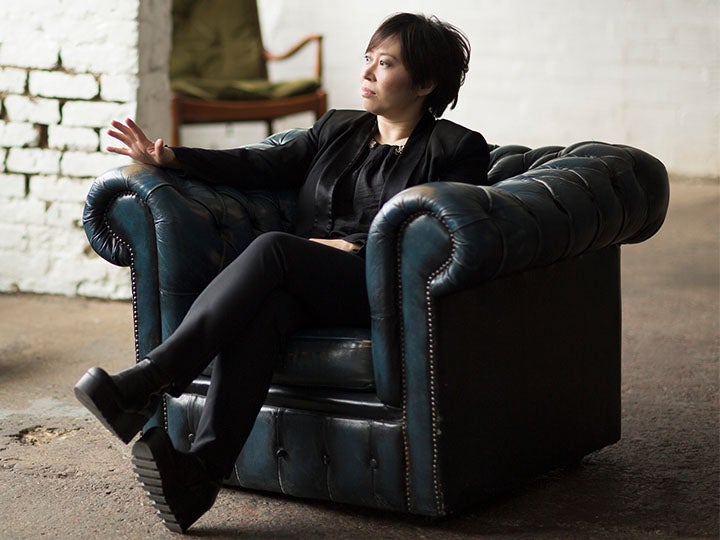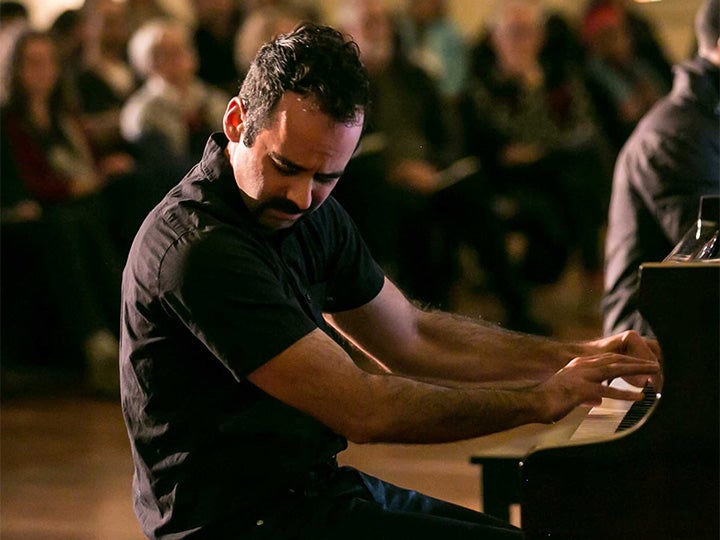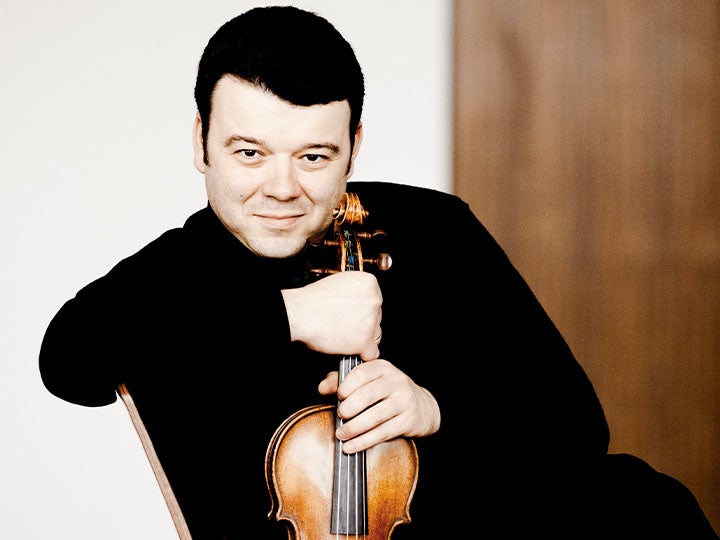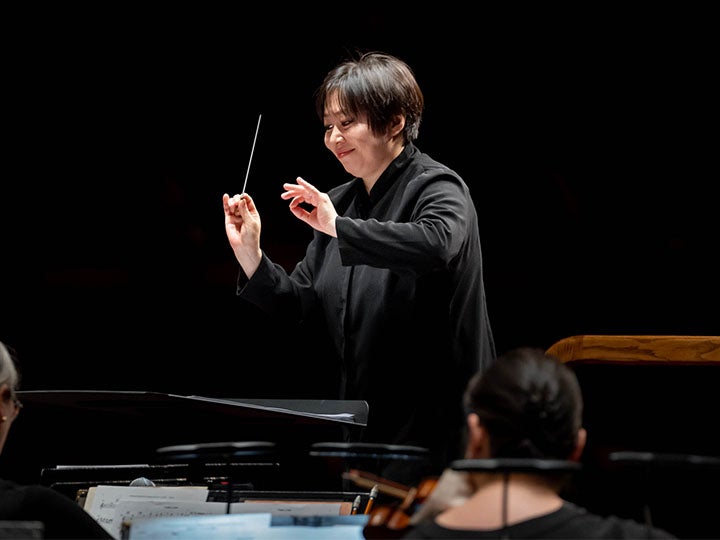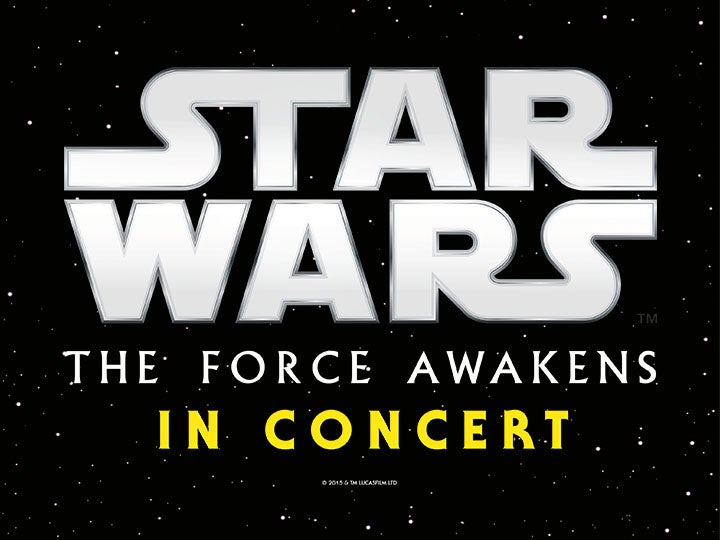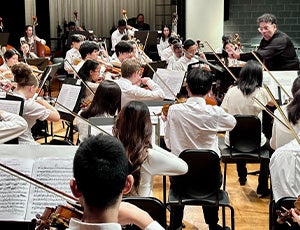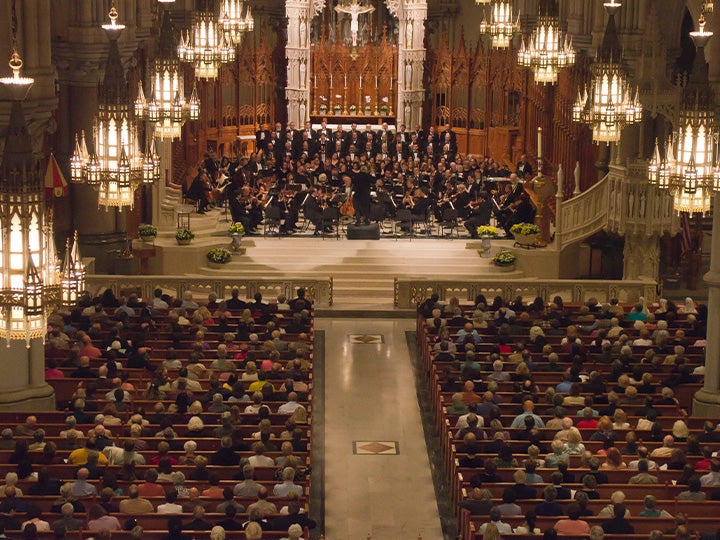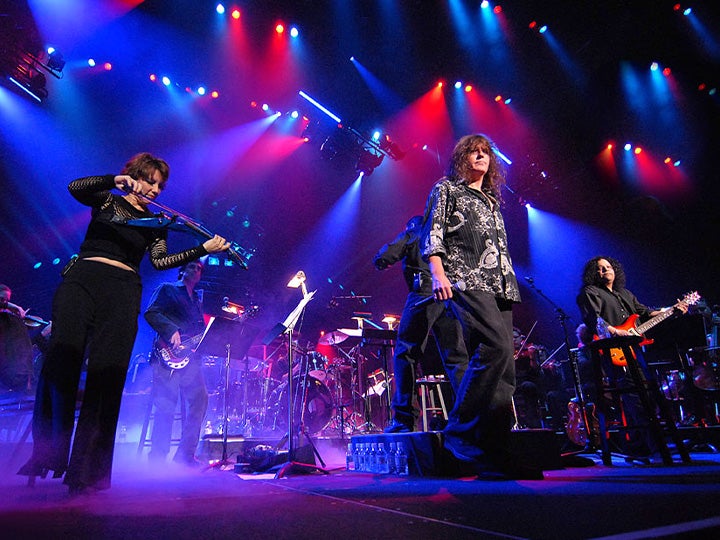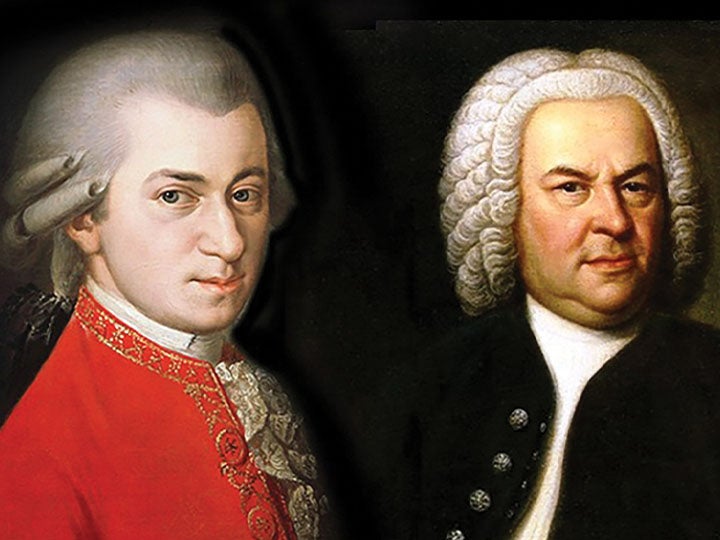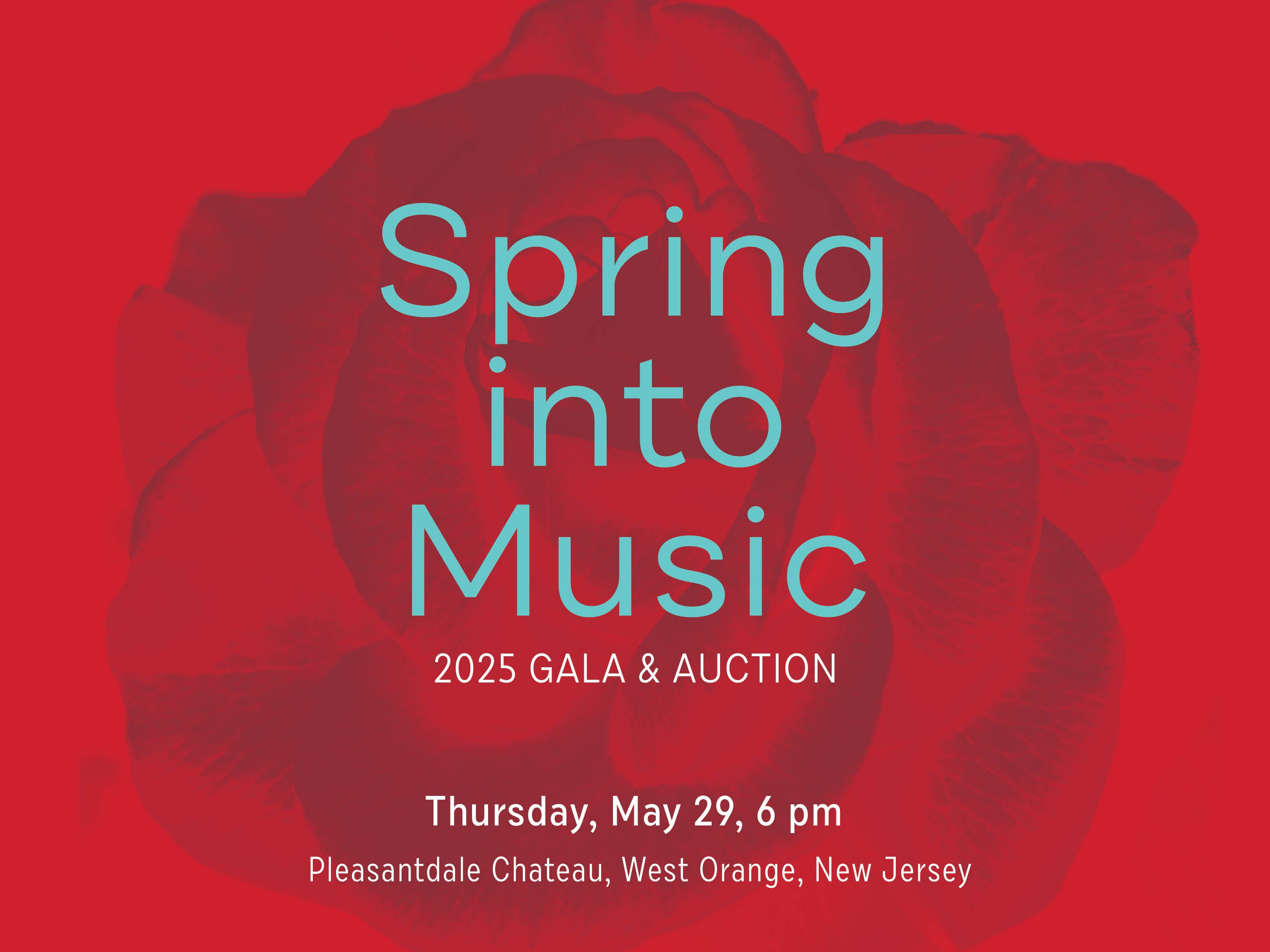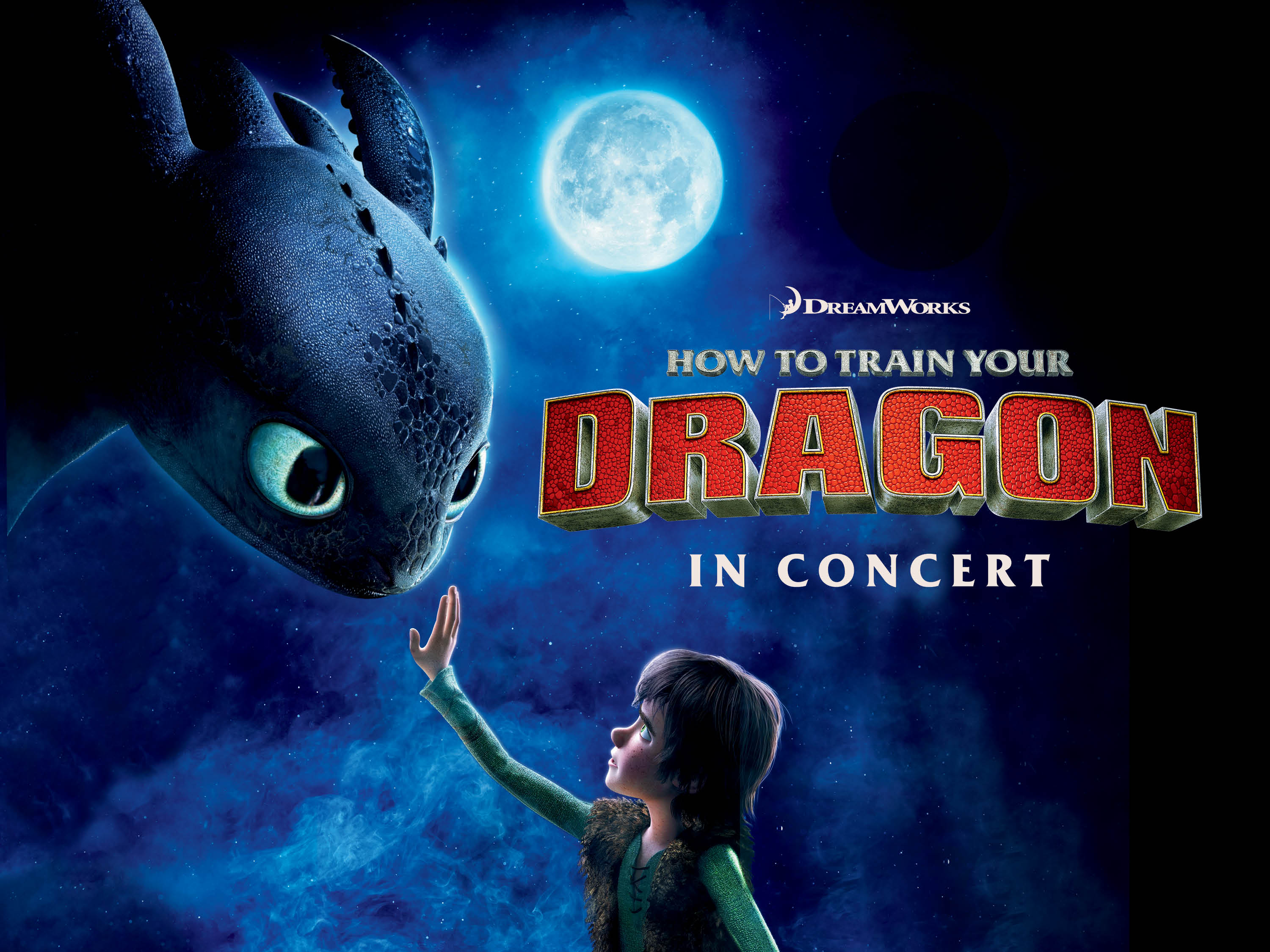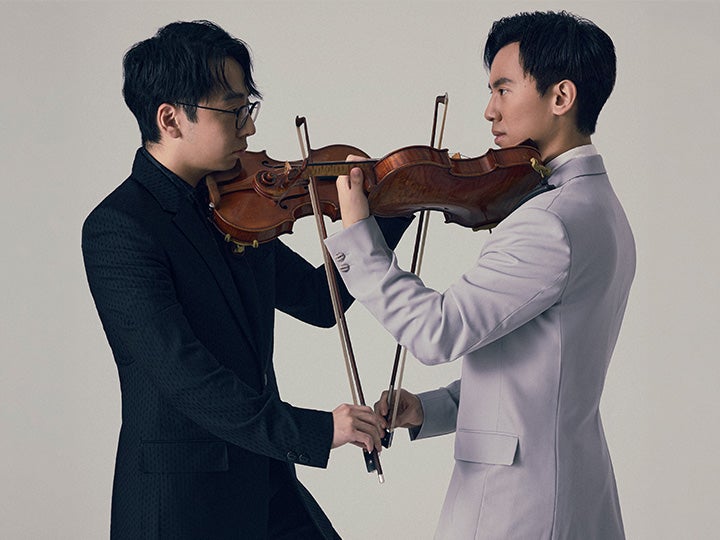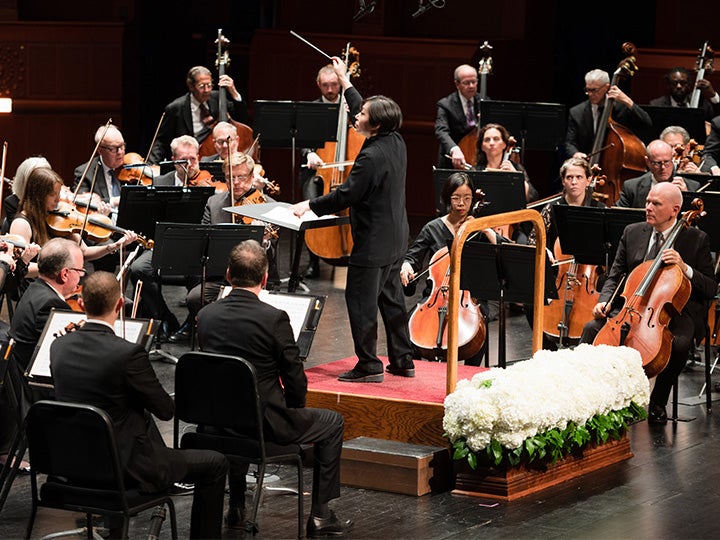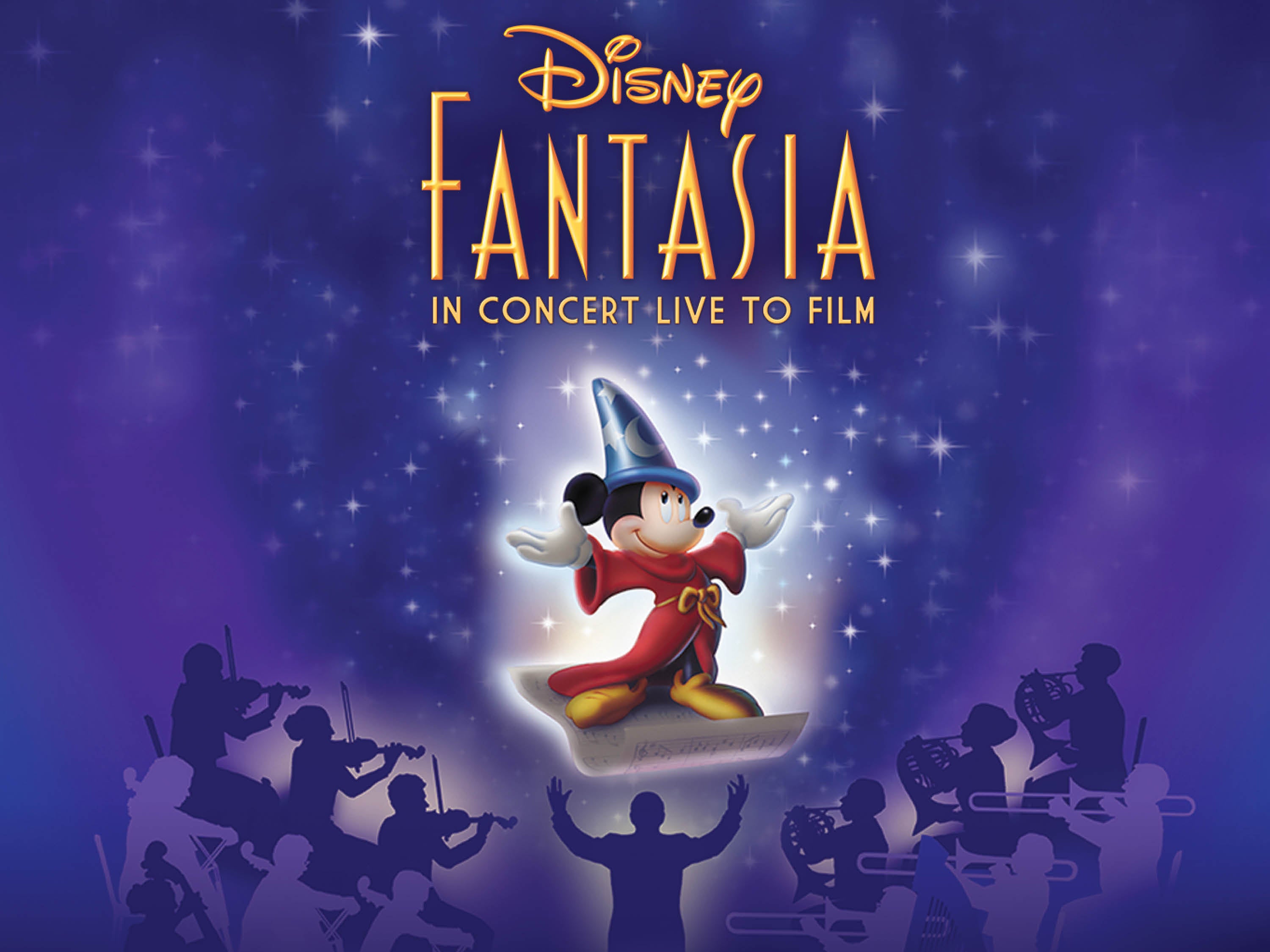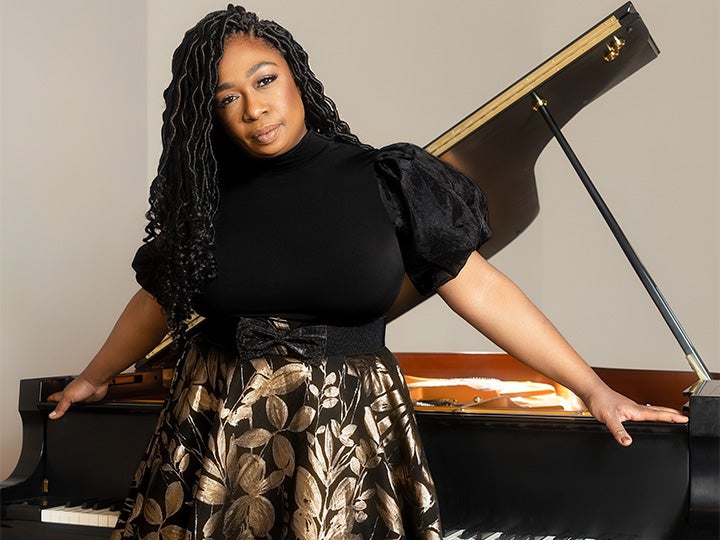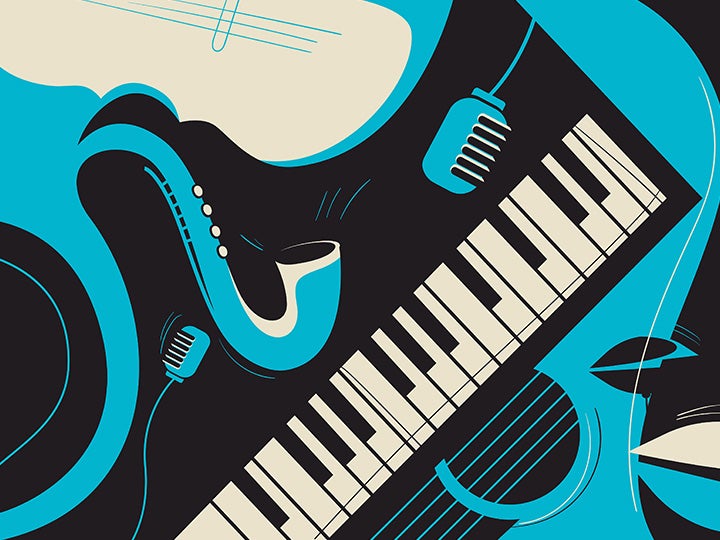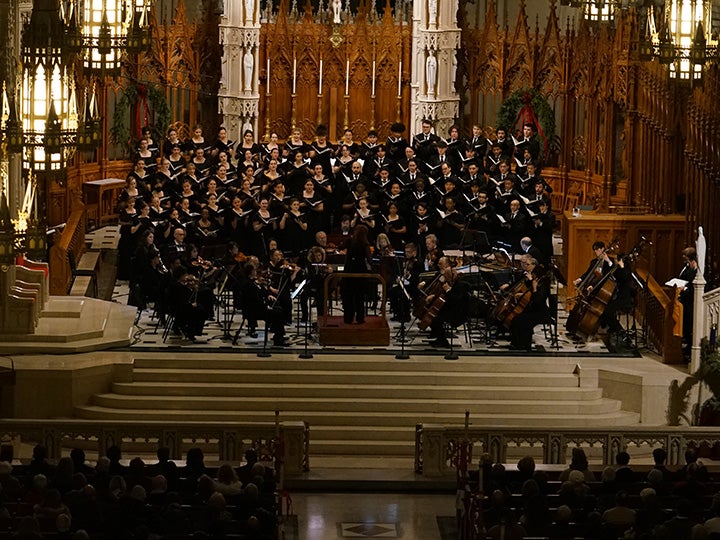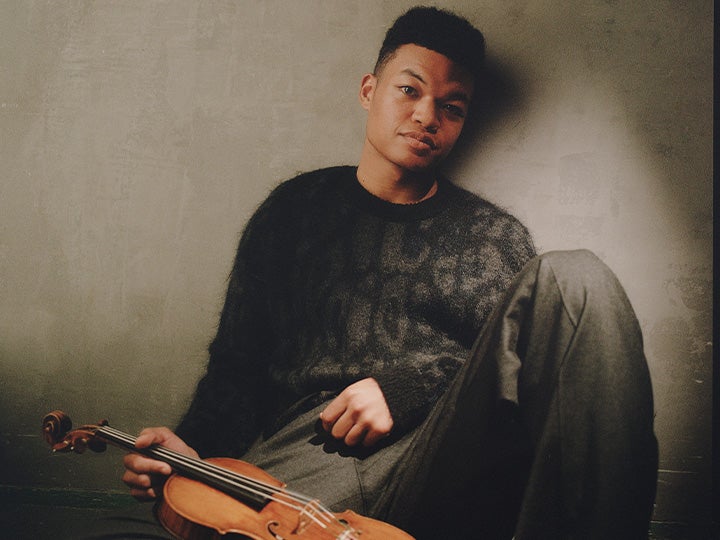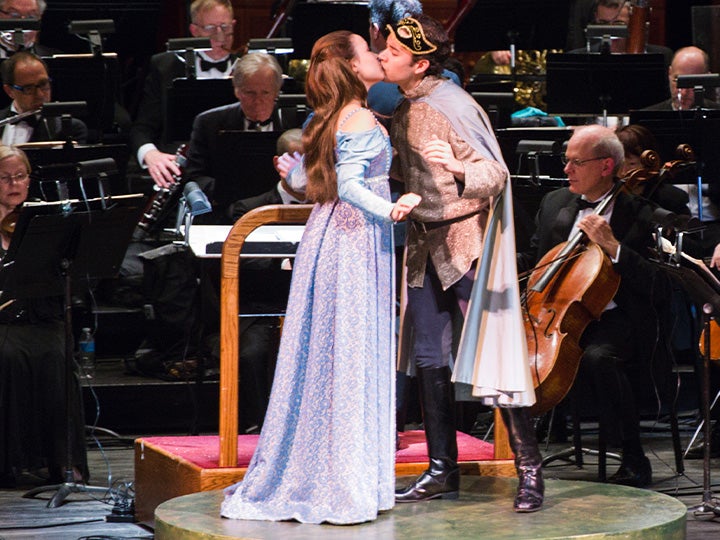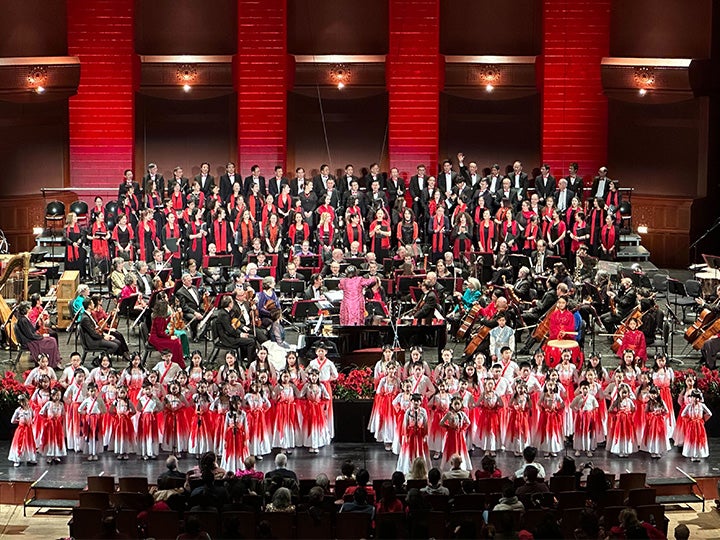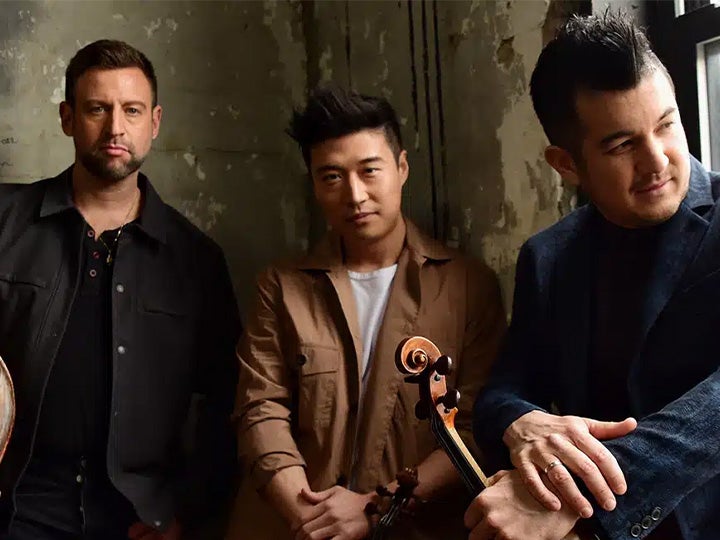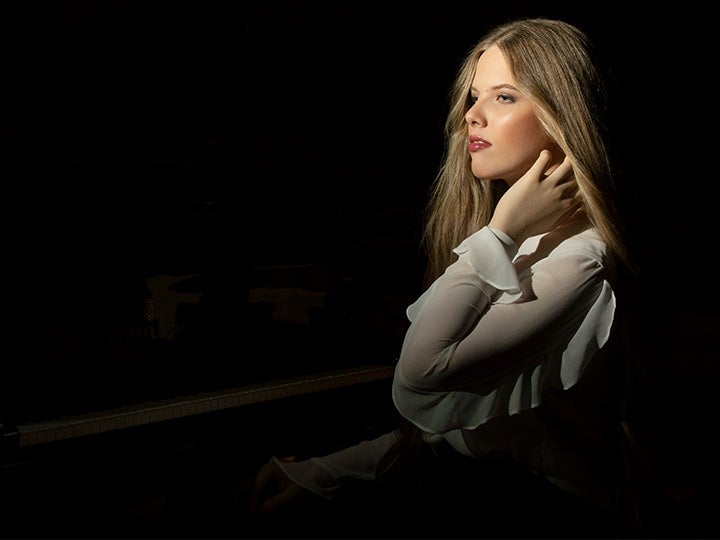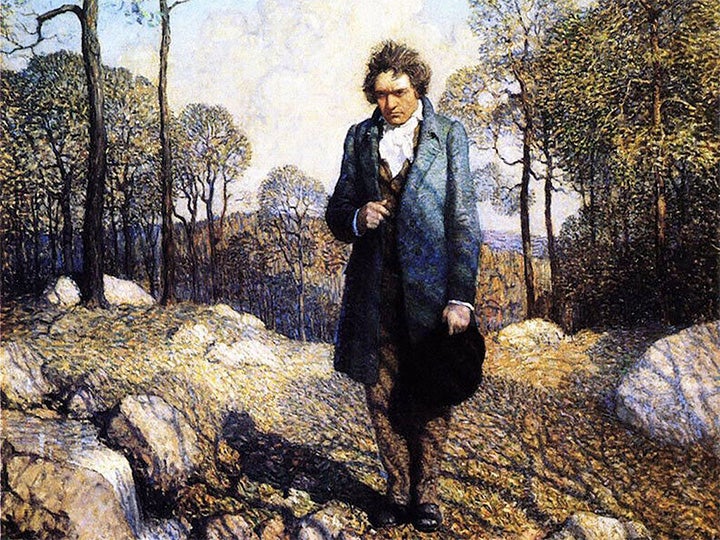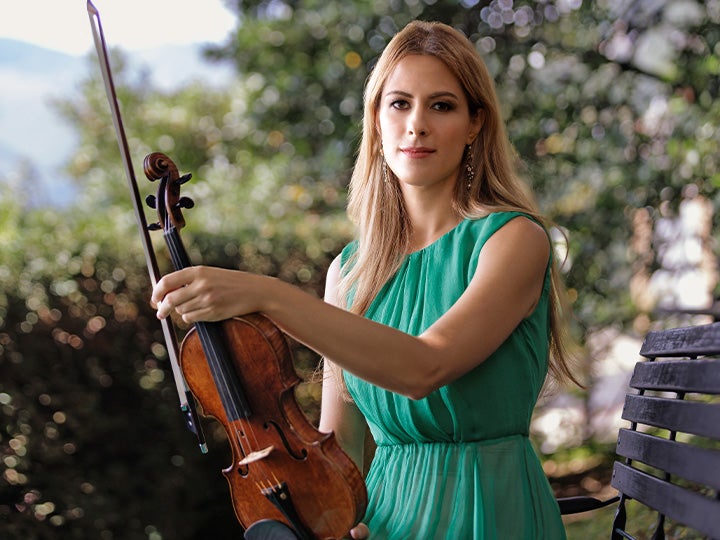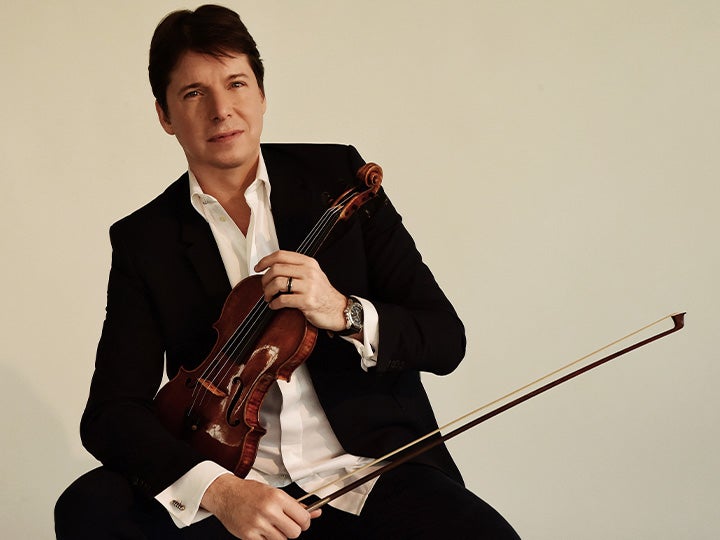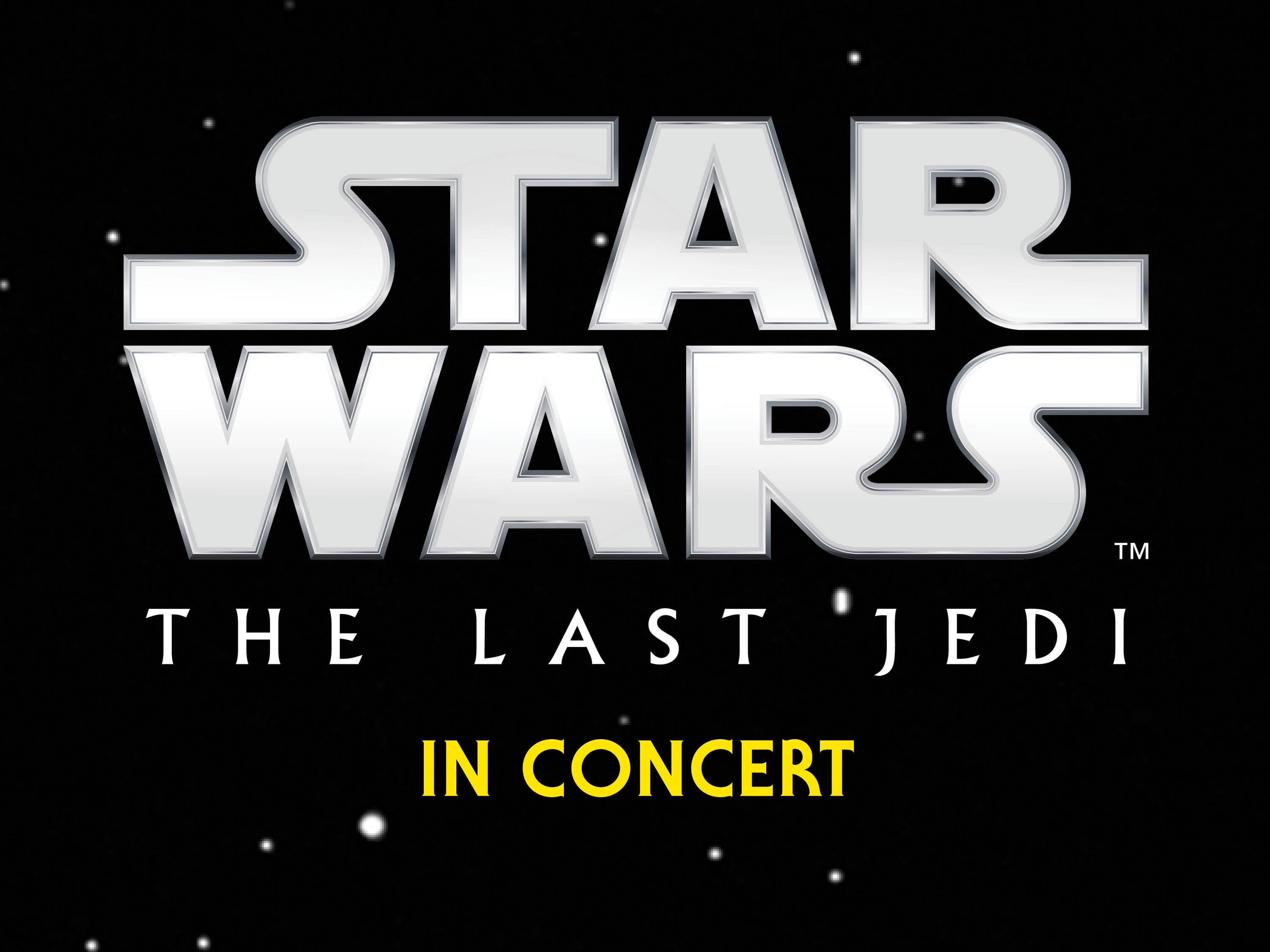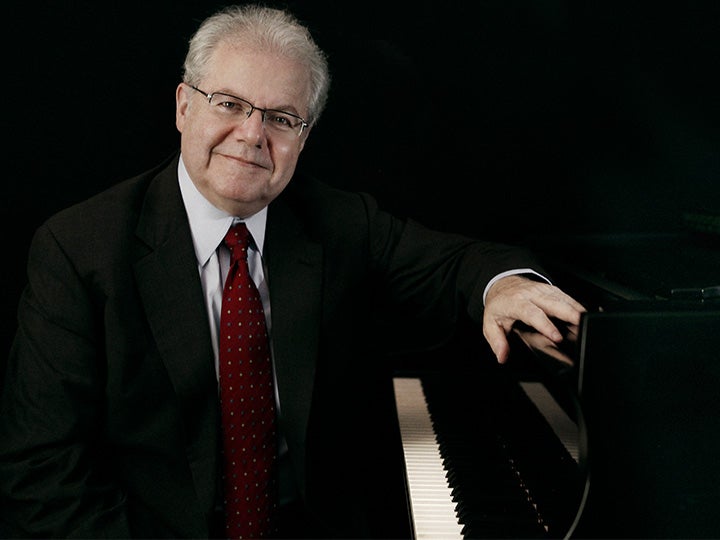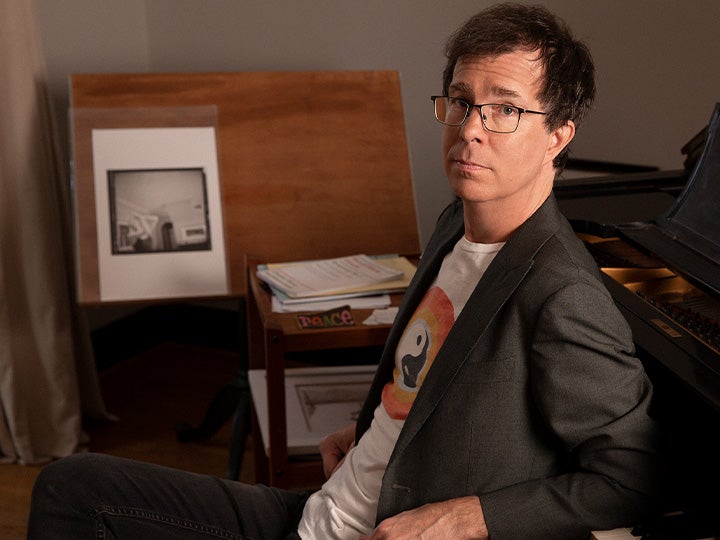The Firebird with Xian Zhang
Featuring Nimbus Dance and new dance choreography! | New Jersey Symphony Classical
Xian Zhang conductor
Jonathan Spitz cello
Nimbus Dance | Samuel Pott, artistic director & choreographer
New Jersey Symphony
- Johann Sebastian Bach Prelude from Cello Suite No. 2
Behold the majesty and wonder of solo Bach, as Principal Cello Jonathan Spitz spins this mesmerizing theme from thin air.
- Caroline Shaw Valencia
The valencia orange, described as “a thing of nature, yet so complex and extraordinary” inspired this expertly-crafted spring quartet.
- Qasim Naqvi God Docks at Death Harbor (Piano Quintet Version)
Naqvi calls this piece “a vision of our planet years from now … the quiet and peacefulness of a world restoring itself.” Nimbus Dance joins with brand new choreography, titled “Dark Water.”
- Igor Stravinsky Divertimento from The Fairy’s Kiss
Stravinsky loved the Romantics like Tchaikovsky, and created this charming and lilting Divertimento after him.
- Igor Stravinsky Suite from The Firebird
Stravinsky's The Firebird has one of the most exciting finales in all classical music, brought to life here with Nimbus Dance at center stage for the Newark concerts. In a dramatic and inventive departure from traditional renditions, Samuel Pott and Nimbus Dance reimagine The Firebird blending myth and modernity. In this tale, an Icarus-like figure, and a girl from a family in turmoil, seek freedom and liberation through flight.
Performed in Newark and Red Bank
The Firebird with Xian Zhang
Featuring Nimbus Dance and new dance choreography! | New Jersey Symphony Classical
Xian Zhang conductor
Jonathan Spitz cello
Nimbus Dance | Samuel Pott, artistic director & choreographer
New Jersey Symphony
- Johann Sebastian Bach Prelude from Cello Suite No. 2
Behold the majesty and wonder of solo Bach, as Principal Cello Jonathan Spitz spins this mesmerizing theme from thin air.
- Caroline Shaw Valencia
The valencia orange, described as “a thing of nature, yet so complex and extraordinary” inspired this expertly-crafted spring quartet.
- Qasim Naqvi God Docks at Death Harbor (Piano Quintet Version)
Naqvi calls this piece “a vision of our planet years from now … the quiet and peacefulness of a world restoring itself.” Nimbus Dance joins with brand new choreography, titled “Dark Water.”
- Igor Stravinsky Divertimento from The Fairy’s Kiss
Stravinsky loved the Romantics like Tchaikovsky, and created this charming and lilting Divertimento after him.
- Igor Stravinsky Suite from The Firebird
Stravinsky's The Firebird has one of the most exciting finales in all classical music, brought to life here with Nimbus Dance at center stage for the Newark concerts. In a dramatic and inventive departure from traditional renditions, Samuel Pott and Nimbus Dance reimagine The Firebird blending myth and modernity. In this tale, an Icarus-like figure, and a girl from a family in turmoil, seek freedom and liberation through flight.
Performed in Newark and Red Bank
The Firebird with Xian Zhang
Featuring Nimbus Dance and new dance choreography! | New Jersey Symphony Classical
Xian Zhang conductor
Jonathan Spitz cello
Nimbus Dance | Samuel Pott, artistic director & choreographer
New Jersey Symphony
- Johann Sebastian Bach Prelude from Cello Suite No. 2
Behold the majesty and wonder of solo Bach, as Principal Cello Jonathan Spitz spins this mesmerizing theme from thin air.
- Caroline Shaw Valencia
The valencia orange, described as “a thing of nature, yet so complex and extraordinary” inspired this expertly-crafted spring quartet.
- Qasim Naqvi God Docks at Death Harbor (Piano Quintet Version)
Naqvi calls this piece “a vision of our planet years from now … the quiet and peacefulness of a world restoring itself.” Nimbus Dance joins with brand new choreography, titled “Dark Water.”
- Igor Stravinsky Divertimento from The Fairy’s Kiss
Stravinsky loved the Romantics like Tchaikovsky, and created this charming and lilting Divertimento after him.
- Igor Stravinsky Suite from The Firebird
Stravinsky's The Firebird has one of the most exciting finales in all classical music, brought to life here with Nimbus Dance at center stage for the Newark concerts. In a dramatic and inventive departure from traditional renditions, Samuel Pott and Nimbus Dance reimagine The Firebird blending myth and modernity. In this tale, an Icarus-like figure, and a girl from a family in turmoil, seek freedom and liberation through flight.
Performed in Newark and Red Bank
Rachmaninoff Symphony No. 2
New Jersey Symphony Classical
Xian Zhang conductor
Gregory D. McDaniel conductor
Adam Tendler piano
New Jersey Symphony
- Claude Debussy Clair de Lune
Debussy’s original piano solo, Clair de Lune, probably exists in more versions than the Beatles’ “Yesterday” and for good reason, as none before or since have captured in music the true magic of moonlight.
- Nico Muhly Sounding for Piano and Orchestra (New Jersey Symphony Co-Commission)
New York-based pianist Adam Tendler, “currently the hottest pianist on the American contemporary classical scene” (Minneapolis Star Tribune), makes his New Jersey Symphony debut in this hymn tune-filled concerto by broadly popular contemporary composer Nico Muhly.
- Sergei Rachmaninoff Symphony No. 2
Melodies too numerous and beautiful to track—so don’t try. Just let this sweeping Romantic symphony, the inspiration for the song “Never Gonna Fall in Love Again,” work its magic.
Performed in Newark, Princeton and Morristown
Rachmaninoff Symphony No. 2
New Jersey Symphony Classical
Xian Zhang conductor
Gregory D. McDaniel conductor
Adam Tendler piano
New Jersey Symphony
- Claude Debussy Clair de Lune
Debussy’s original piano solo, Clair de Lune, probably exists in more versions than the Beatles’ “Yesterday” and for good reason, as none before or since have captured in music the true magic of moonlight.
- Nico Muhly Sounding for Piano and Orchestra (New Jersey Symphony Co-Commission)
New York-based pianist Adam Tendler, “currently the hottest pianist on the American contemporary classical scene” (Minneapolis Star Tribune), makes his New Jersey Symphony debut in this hymn tune-filled concerto by broadly popular contemporary composer Nico Muhly.
- Sergei Rachmaninoff Symphony No. 2
Melodies too numerous and beautiful to track—so don’t try. Just let this sweeping Romantic symphony, the inspiration for the song “Never Gonna Fall in Love Again,” work its magic.
Performed in Newark, Princeton and Morristown
Rachmaninoff Symphony No. 2
New Jersey Symphony Classical
Xian Zhang conductor
Gregory D. McDaniel conductor
Adam Tendler piano
New Jersey Symphony
- Claude Debussy Clair de Lune
Debussy’s original piano solo, Clair de Lune, probably exists in more versions than the Beatles’ “Yesterday” and for good reason, as none before or since have captured in music the true magic of moonlight.
- Nico Muhly Sounding for Piano and Orchestra (New Jersey Symphony Co-Commission)
New York-based pianist Adam Tendler, “currently the hottest pianist on the American contemporary classical scene” (Minneapolis Star Tribune), makes his New Jersey Symphony debut in this hymn tune-filled concerto by broadly popular contemporary composer Nico Muhly.
- Sergei Rachmaninoff Symphony No. 2
Melodies too numerous and beautiful to track—so don’t try. Just let this sweeping Romantic symphony, the inspiration for the song “Never Gonna Fall in Love Again,” work its magic.
Performed in Newark, Princeton and Morristown
Rachmaninoff Symphony No. 2
New Jersey Symphony Classical
Xian Zhang conductor
Gregory D. McDaniel conductor
Adam Tendler piano
New Jersey Symphony
- Claude Debussy Clair de Lune
Debussy’s original piano solo, Clair de Lune, probably exists in more versions than the Beatles’ “Yesterday” and for good reason, as none before or since have captured in music the true magic of moonlight.
- Nico Muhly Sounding for Piano and Orchestra (New Jersey Symphony Co-Commission)
New York-based pianist Adam Tendler, “currently the hottest pianist on the American contemporary classical scene” (Minneapolis Star Tribune), makes his New Jersey Symphony debut in this hymn tune-filled concerto by broadly popular contemporary composer Nico Muhly.
- Sergei Rachmaninoff Symphony No. 2
Melodies too numerous and beautiful to track—so don’t try. Just let this sweeping Romantic symphony, the inspiration for the song “Never Gonna Fall in Love Again,” work its magic.
Performed in Newark, Princeton and Morristown
Brahms Violin Concerto with Vadim Gluzman
New Jersey Symphony Classical
Lina González-Granados conductor
Vadim Gluzman violin
New Jersey Symphony
- Robert Schumann Overture, Scherzo and Finale
Bursting with a love of life in the months after his marriage to Clara, Robert Schumann created three fantastic movements–one shy of a full symphony but which stand magnificently on their own.
- Gabriela Ortiz Clara
A fascinating depiction of the 19th-century composer-pianist Clara Schumann’s inner life as imagined by one of Mexico's leading contemporary composers.
- Johannes Brahms Violin Concerto
A favorite of New Jersey Symphony audiences, Vadim Gluzman returns with his signature singing tone to play what Brahms began as simply “a few violin passages,” but turned into one of the greatest of all concertos.
Performed in New Brunswick, Red Bank and Newark
Brahms Violin Concerto with Vadim Gluzman
New Jersey Symphony Classical
Lina González-Granados conductor
Vadim Gluzman violin
New Jersey Symphony
- Robert Schumann Overture, Scherzo and Finale
Bursting with a love of life in the months after his marriage to Clara, Robert Schumann created three fantastic movements–one shy of a full symphony but which stand magnificently on their own.
- Gabriela Ortiz Clara
A fascinating depiction of the 19th-century composer-pianist Clara Schumann’s inner life as imagined by one of Mexico's leading contemporary composers.
- Johannes Brahms Violin Concerto
A favorite of New Jersey Symphony audiences, Vadim Gluzman returns with his signature singing tone to play what Brahms began as simply “a few violin passages,” but turned into one of the greatest of all concertos.
Performed in New Brunswick, Red Bank and Newark
Brahms Violin Concerto with Vadim Gluzman
New Jersey Symphony Classical
Lina González-Granados conductor
Vadim Gluzman violin
New Jersey Symphony
- Robert Schumann Overture, Scherzo and Finale
Bursting with a love of life in the months after his marriage to Clara, Robert Schumann created three fantastic movements–one shy of a full symphony but which stand magnificently on their own.
- Gabriela Ortiz Clara
A fascinating depiction of the 19th-century composer-pianist Clara Schumann’s inner life as imagined by one of Mexico's leading contemporary composers.
- Johannes Brahms Violin Concerto
A favorite of New Jersey Symphony audiences, Vadim Gluzman returns with his signature singing tone to play what Brahms began as simply “a few violin passages,” but turned into one of the greatest of all concertos.
Performed in New Brunswick, Red Bank and Newark
Beethoven’s Ninth Symphony with Xian Zhang
New Jersey Symphony Classical
Xian Zhang conductor
Gregory D. McDaniel conductor
Steven Banks saxophone
Felicia Moore soprano
Kelley O’Connor mezzo-soprano
Issachah Savage tenor
Reginald Smith Jr. baritone
Montclair State University Chorale | Heather J. Buchanan, director
New Jersey Symphony
- Pytor Ilyich Tchaikovsky Polonaise from Eugene Onegin
A lavish ball scene, the dashing hero and heroine twirling in splendor—a fun, festive dance lifted from Tchaikovsky’s opera.
- Billy Childs Diaspora
Inspired by Maya Angelou and other poets, Childs’ new concerto was written for the amazing Steven Banks, who says the music “follows the trajectory of the Black experience from Africa before slave trade to now, going forward in hope.”
- Ludwig van Beethoven Symphony No. 9, “Choral”
The sheer volcanic power of Beethoven’s music makes the Ninth’s message soar. “Brotherhood! Joy!”—our world needs these clarion calls now more than ever.
Performed in Newark and New Brunswick
Beethoven’s Ninth Symphony with Xian Zhang
New Jersey Symphony Classical
Xian Zhang conductor
Gregory D. McDaniel conductor
Steven Banks saxophone
Felicia Moore soprano
Kelley O’Connor mezzo-soprano
Issachah Savage tenor
Reginald Smith Jr. baritone
Montclair State University Chorale | Heather J. Buchanan, director
New Jersey Symphony
- Pytor Ilyich Tchaikovsky Polonaise from Eugene Onegin
A lavish ball scene, the dashing hero and heroine twirling in splendor—a fun, festive dance lifted from Tchaikovsky’s opera.
- Billy Childs Diaspora
Inspired by Maya Angelou and other poets, Childs’ new concerto was written for the amazing Steven Banks, who says the music “follows the trajectory of the Black experience from Africa before slave trade to now, going forward in hope.”
- Ludwig van Beethoven Symphony No. 9, “Choral”
The sheer volcanic power of Beethoven’s music makes the Ninth’s message soar. “Brotherhood! Joy!”—our world needs these clarion calls now more than ever.
Performed in Newark and New Brunswick
Beethoven’s Ninth Symphony with Xian Zhang
New Jersey Symphony Classical
Xian Zhang conductor
Gregory D. McDaniel conductor
Steven Banks saxophone
Felicia Moore soprano
Kelley O’Connor mezzo-soprano
Issachah Savage tenor
Reginald Smith Jr. baritone
Montclair State University Chorale | Heather J. Buchanan, director
New Jersey Symphony
- Pytor Ilyich Tchaikovsky Polonaise from Eugene Onegin
A lavish ball scene, the dashing hero and heroine twirling in splendor—a fun, festive dance lifted from Tchaikovsky’s opera.
- Billy Childs Diaspora
Inspired by Maya Angelou and other poets, Childs’ new concerto was written for the amazing Steven Banks, who says the music “follows the trajectory of the Black experience from Africa before slave trade to now, going forward in hope.”
- Ludwig van Beethoven Symphony No. 9, “Choral”
The sheer volcanic power of Beethoven’s music makes the Ninth’s message soar. “Brotherhood! Joy!”—our world needs these clarion calls now more than ever.
Performed in Newark and New Brunswick
Beethoven’s Ninth Symphony with Xian Zhang
New Jersey Symphony Classical
Xian Zhang conductor
Gregory D. McDaniel conductor
Steven Banks saxophone
Felicia Moore soprano
Kelley O’Connor mezzo-soprano
Issachah Savage tenor
Reginald Smith Jr. baritone
Montclair State University Chorale | Heather J. Buchanan, director
New Jersey Symphony
- Pytor Ilyich Tchaikovsky Polonaise from Eugene Onegin
A lavish ball scene, the dashing hero and heroine twirling in splendor—a fun, festive dance lifted from Tchaikovsky’s opera.
- Billy Childs Diaspora
Inspired by Maya Angelou and other poets, Childs’ new concerto was written for the amazing Steven Banks, who says the music “follows the trajectory of the Black experience from Africa before slave trade to now, going forward in hope.”
- Ludwig van Beethoven Symphony No. 9, “Choral”
The sheer volcanic power of Beethoven’s music makes the Ninth’s message soar. “Brotherhood! Joy!”—our world needs these clarion calls now more than ever.
Performed in Newark and New Brunswick
Star Wars: The Force Awakens in Concert
New Jersey Symphony at the Movies
Constantine Kitsopoulos conductor
New Jersey Symphony
Thirty years after the defeat of the Empire, Luke Skywalker has vanished, and a new threat has risen: The First Order, led by the mysterious Supreme Leader Snoke and his enforcer, Kylo Ren. General Leia Organa’s military force, the Resistance—and unlikely heroes brought together by fate—are the galaxy’s only hope. Experience the complete film with the New Jersey Symphony performing John Williams’ thrilling score live.
Performed in Red Bank, Morristown, Newark and New Brunswick
Star Wars: The Force Awakens in Concert
New Jersey Symphony at the Movies
Constantine Kitsopoulos conductor
New Jersey Symphony
Thirty years after the defeat of the Empire, Luke Skywalker has vanished, and a new threat has risen: The First Order, led by the mysterious Supreme Leader Snoke and his enforcer, Kylo Ren. General Leia Organa’s military force, the Resistance—and unlikely heroes brought together by fate—are the galaxy’s only hope. Experience the complete film with the New Jersey Symphony performing John Williams’ thrilling score live.
Performed in Red Bank, Morristown, Newark and New Brunswick
Star Wars: The Force Awakens in Concert
New Jersey Symphony at the Movies
Constantine Kitsopoulos conductor
New Jersey Symphony
Thirty years after the defeat of the Empire, Luke Skywalker has vanished, and a new threat has risen: The First Order, led by the mysterious Supreme Leader Snoke and his enforcer, Kylo Ren. General Leia Organa’s military force, the Resistance—and unlikely heroes brought together by fate—are the galaxy’s only hope. Experience the complete film with the New Jersey Symphony performing John Williams’ thrilling score live.
Performed in Red Bank, Morristown, Newark and New Brunswick
Star Wars: The Force Awakens in Concert
New Jersey Symphony at the Movies
Constantine Kitsopoulos conductor
New Jersey Symphony
Thirty years after the defeat of the Empire, Luke Skywalker has vanished, and a new threat has risen: The First Order, led by the mysterious Supreme Leader Snoke and his enforcer, Kylo Ren. General Leia Organa’s military force, the Resistance—and unlikely heroes brought together by fate—are the galaxy’s only hope. Experience the complete film with the New Jersey Symphony performing John Williams’ thrilling score live.
Performed in Red Bank, Morristown, Newark and New Brunswick
Youth Orchestra Spring Concert
Two performances in one day! | Youth Orchestra Showcase
Diego García artistic director, The Anna P. Drago Chair
Terrence Thornhill associate conductor & curriculum specialist
New Jersey Symphony Youth Orchestra, The Resident Youth Orchestra of the John J. Cali School of Music at Montclair State University
The New Jersey Symphony Youth Orchestra will showcase 300 talented young musicians across two performances as part of their annual Spring Concert on Sunday, April 27 in Newark. Experience vibrant performances and celebrate the achievements of the 2024–25 season, including a special tribute to the graduating seniors.
Performed in Newark
Youth Orchestra Spring Concert
Two performances in one day! | Youth Orchestra Showcase
Diego García artistic director, The Anna P. Drago Chair
Terrence Thornhill associate conductor & curriculum specialist
New Jersey Symphony Youth Orchestra, The Resident Youth Orchestra of the John J. Cali School of Music at Montclair State University
The New Jersey Symphony Youth Orchestra will showcase 300 talented young musicians across two performances as part of their annual Spring Concert on Sunday, April 27 in Newark. Experience vibrant performances and celebrate the achievements of the 2024–25 season, including a special tribute to the graduating seniors.
Performed in Newark
Haydn’s Creation
New Jersey Symphony at the Cathedral
John J. Miller conductor
Lorraine Ernest soprano
Theodore Chletsos tenor
Jorge Ocasio bass-baritone
The Archdiocesan Festival Choir
The Cathedral Choir
New Jersey Symphony
The Cathedral Basilica of the Sacred Heart in Newark, NJ invites all to experience the music of Franz Joseph Haydn’s The Creation, featuring The Archdiocesan Festival Choir, The Cathedral Choir, vocal soloists and the New Jersey Symphony with John J. Miller conducting.
Performed in Newark
The Music of Led Zeppelin
Featuring hits like “Kashmir,” “Black Dog,” “Stairway to Heaven” and more!
Brent Havens conductor & arranger
Windborne Music Group
Justin Sargent vocalist
New Jersey Symphony
The New Jersey Symphony and Windborne Music Group bridge the gulf between classical music and rock n’ roll to present The Music of Led Zeppelin, celebrating the best of the legendary classic rock group. Amplified with full-on guitars and screaming vocals, sing and dance along as Led Zeppelin’s “sheer blast and power” is put on full display riff for riff with new musical colors. Timeless hits like “Kashmir,” “Black Dog,” “Stairway to Heaven” and more will get you on your feet in this special concert you don’t want to miss!
Performed in Englewood and New Brunswick
The Music of Led Zeppelin
Featuring hits like “Kashmir,” “Black Dog,” “Stairway to Heaven” and more!
Brent Havens conductor & arranger
Windborne Music Group
Justin Sargent vocalist
New Jersey Symphony
The New Jersey Symphony and Windborne Music Group bridge the gulf between classical music and rock n’ roll to present The Music of Led Zeppelin, celebrating the best of the legendary classic rock group. Amplified with full-on guitars and screaming vocals, sing and dance along as Led Zeppelin’s “sheer blast and power” is put on full display riff for riff with new musical colors. Timeless hits like “Kashmir,” “Black Dog,” “Stairway to Heaven” and more will get you on your feet in this special concert you don’t want to miss!
Performed in Englewood and New Brunswick
Xian Conducts Mozart
New Jersey Symphony musicians take the spotlight!
Xian Zhang conductor
Eric Wyrick violin
Francine Storck violin
New Jersey Symphony
- Wolfgang Amadeus Mozart Eine kleine Nachtmusik
Mozart may have tossed this off for a Viennese party one evening, but there is no piece more charming and beguiling than his “a little night music.”
- Johann Sebastian Bach Double Concerto for Two Violins
The spotlight’s on our two superstar principal violins, Eric Wyrick and Francine Storck, in perhaps the most beautiful duet ever created.
- Michael Abels Delights and Dances
Delight in this imaginative, bluesy work for solo string quartet and string orchestra, with New Jersey Symphony’s own musicians taking the spotlight in a series of captivating solos.
- Wolfgang Amadeus Mozart Symphony No. 35, “Haffner”
Mozart had intended to jot down a little occasional piece, but brilliant music kept pouring out of his pen until he’d made a dazzling full-fledged symphony, one of his best.
Performed in Princeton and Newark
Discover Mozart & Bach
New Jersey Symphony Family Concert:
A Music Discovery Zone
Xian Zhang conductor
Gregory D. McDaniel conductor
Bill Barclay host
Eric Wyrick violin
Francine Storck violin
Annamaria Witek cello
New Jersey Symphony
Discover what makes a live orchestra concert so special. We’ll take a deep dive into works by Mozart, as well as J.S. Bach’s incredibly famous Double Concerto for Two Violins. Also featured on the program is 2024 Henry Lewis Concerto Competition winner, cellist Annamaria Witek. Inspired by Leonard Bernstein’s masterful way of putting young audiences at the center of music-making, this interactive concert will feature inside tips, listening cues and fun facts that make for the perfect Saturday afternoon family outing!
- Wolfgang Amadeus Mozart Selection from Eine kleine Nachtmusik
- Camille Saint-Saëns Selection from Cello Concerto No. 1
- Johann Sebastian Bach Double Concerto for Two Violins
- Wolfgang Amadeus Mozart Symphony No. 35, “Haffner”
Performed in Newark
Xian Conducts Mozart
New Jersey Symphony musicians take the spotlight!
Xian Zhang conductor
Eric Wyrick violin
Francine Storck violin
New Jersey Symphony
- Wolfgang Amadeus Mozart Eine kleine Nachtmusik
Mozart may have tossed this off for a Viennese party one evening, but there is no piece more charming and beguiling than his “a little night music.”
- Johann Sebastian Bach Double Concerto for Two Violins
The spotlight’s on our two superstar principal violins, Eric Wyrick and Francine Storck, in perhaps the most beautiful duet ever created.
- Michael Abels Delights and Dances
Delight in this imaginative, bluesy work for solo string quartet and string orchestra, with New Jersey Symphony’s own musicians taking the spotlight in a series of captivating solos.
- Wolfgang Amadeus Mozart Symphony No. 35, “Haffner”
Mozart had intended to jot down a little occasional piece, but brilliant music kept pouring out of his pen until he’d made a dazzling full-fledged symphony, one of his best.
Performed in Princeton and Newark
Xian Conducts Mozart
New Jersey Symphony musicians take the spotlight!
Xian Zhang conductor
Eric Wyrick violin
Francine Storck violin
New Jersey Symphony
- Wolfgang Amadeus Mozart Eine kleine Nachtmusik
Mozart may have tossed this off for a Viennese party one evening, but there is no piece more charming and beguiling than his “a little night music.”
- Johann Sebastian Bach Double Concerto for Two Violins
The spotlight’s on our two superstar principal violins, Eric Wyrick and Francine Storck, in perhaps the most beautiful duet ever created.
- Michael Abels Delights and Dances
Delight in this imaginative, bluesy work for solo string quartet and string orchestra, with New Jersey Symphony’s own musicians taking the spotlight in a series of captivating solos.
- Wolfgang Amadeus Mozart Symphony No. 35, “Haffner”
Mozart had intended to jot down a little occasional piece, but brilliant music kept pouring out of his pen until he’d made a dazzling full-fledged symphony, one of his best.
Performed in Princeton and Newark
2025 Spring into Music Gala & Auction
Gala Reception and Dinner, Concert and Auction
Join the New Jersey Symphony and an array of cultural, social, business and civic leaders for an unforgettable evening of fine dining and entertainment as we honor former Governor Thomas H. Kean and his dedication to the performing arts industry in New Jersey. The event will feature a lavish cocktail reception with a few dazzling surprises, a dinner with a private performance featuring members of the New Jersey Symphony and students of the New Jersey Symphony Youth Orchestra and a silent auction.
Presented in West Orange
Rachmaninoff and Shostakovich
Season Finale | New Jersey Symphony Classical
Xian Zhang conductor
Conrad Tao piano
New Jersey Symphony
- Sergei Rachmaninoff Piano Concerto No. 2
No piece has introduced and won more people to classical music than Rachmaninoff’s magnificent work for piano and orchestra.
- Dmitri Shostakovich Symphony No. 5
When Shostakovich’s Fifth received a half-hour standing ovation at its premiere, the world knew that a classic was born—and it remains a landmark work for the virtuoso orchestra.
Performed in Morristown, Princeton, Red Bank and Newark
Rachmaninoff and Shostakovich
Season Finale | New Jersey Symphony Classical
Xian Zhang conductor
Conrad Tao piano
New Jersey Symphony
- Sergei Rachmaninoff Piano Concerto No. 2
No piece has introduced and won more people to classical music than Rachmaninoff’s magnificent work for piano and orchestra.
- Dmitri Shostakovich Symphony No. 5
When Shostakovich’s Fifth received a half-hour standing ovation at its premiere, the world knew that a classic was born—and it remains a landmark work for the virtuoso orchestra.
Performed in Morristown, Princeton, Red Bank and Newark
Rachmaninoff and Shostakovich
Season Finale | New Jersey Symphony Classical
Xian Zhang conductor
Conrad Tao piano
New Jersey Symphony
- Sergei Rachmaninoff Piano Concerto No. 2
No piece has introduced and won more people to classical music than Rachmaninoff’s magnificent work for piano and orchestra.
- Dmitri Shostakovich Symphony No. 5
When Shostakovich’s Fifth received a half-hour standing ovation at its premiere, the world knew that a classic was born—and it remains a landmark work for the virtuoso orchestra.
Performed in Morristown, Princeton, Red Bank and Newark
Rachmaninoff and Shostakovich
Season Finale | New Jersey Symphony Classical
Xian Zhang conductor
Conrad Tao piano
New Jersey Symphony
- Sergei Rachmaninoff Piano Concerto No. 2
No piece has introduced and won more people to classical music than Rachmaninoff’s magnificent work for piano and orchestra.
- Dmitri Shostakovich Symphony No. 5
When Shostakovich’s Fifth received a half-hour standing ovation at its premiere, the world knew that a classic was born—and it remains a landmark work for the virtuoso orchestra.
Performed in Morristown, Princeton, Red Bank and Newark
How to Train Your Dragon in Concert
New Jersey Symphony at the Movies
Lawrence Loh conductor
New Jersey Symphony
DreamWorks’ How to Train Your Dragon is a captivating and original story about a young Viking named Hiccup, who defies tradition when he befriends one of his deadliest foes—a ferocious dragon he calls Toothless. Together, these unlikely heroes must fight against all odds to save both their worlds. Featuring John Powell’s Oscar-nominated score performed live to picture, How to Train Your Dragon in Concert is a thrilling experience for all ages.
Performed in Morristown, New Brunswick and Newark
How to Train Your Dragon in Concert
New Jersey Symphony at the Movies
Lawrence Loh conductor
New Jersey Symphony
DreamWorks’ How to Train Your Dragon is a captivating and original story about a young Viking named Hiccup, who defies tradition when he befriends one of his deadliest foes—a ferocious dragon he calls Toothless. Together, these unlikely heroes must fight against all odds to save both their worlds. Featuring John Powell’s Oscar-nominated score performed live to picture, How to Train Your Dragon in Concert is a thrilling experience for all ages.
Performed in Morristown, New Brunswick and Newark
How to Train Your Dragon in Concert
New Jersey Symphony at the Movies
Lawrence Loh conductor
New Jersey Symphony
DreamWorks’ How to Train Your Dragon is a captivating and original story about a young Viking named Hiccup, who defies tradition when he befriends one of his deadliest foes—a ferocious dragon he calls Toothless. Together, these unlikely heroes must fight against all odds to save both their worlds. Featuring John Powell’s Oscar-nominated score performed live to picture, How to Train Your Dragon in Concert is a thrilling experience for all ages.
Performed in Morristown, New Brunswick and Newark
TwoSet Violin with the New Jersey Symphony
Part of the TwoSet Violin World Tour
TwoSet Violin
New Jersey Symphony
World-famous YouTube classical music comedy duo TwoSet Violin take the stage with the New Jersey Symphony for a wide-ranging night of musical fun! Violinists Eddy Chen and Brett Yang will take their unique brand of earnest and silly musical comedy to a new level in this performance, with the backing of a full symphony orchestra.
Performed in Newark
Opening Night Celebration
Dinner Prelude, Concert and After-Party
You are invited to the New Jersey Symphony’s 2025 Season Opening Celebration honoring Xian Zhang’s 10th season as Music Director. Guests will enjoy an elegant dinner prelude, the season opening concert featuring Music Director Xian Zhang, guest artist Joyce Yang and the New Jersey Symphony and a dessert after-party.
Presented in Newark
Tchaikovsky’s Piano Concerto No. 1
Opening Weekend | New Jersey Symphony Classical
Xian Zhang conductor
Joyce Yang piano
New Jersey Symphony
- Jessie Montgomery Hymn for Everyone
We launch the season with Montgomery’s open-arms musical welcome. In her Hymn for Everyone you’ll hear an echo of “Lift Every Voice and Sing,” often called the Black National Anthem.
- Pyotr Ilyich Tchaikovsky Piano Concerto No. 1
Slammed as a flop at its premiere, Tchaikovsky more than had the last laugh: here’s jaw-dropping virtuosity for the soloist, sweeping melodies for the orchestra, and an audience favorite around the world.
- Antonín Dvořák Symphony No. 8
Dvořák’s pen might as well have been a paint brush. In his tuneful Eighth you can practically see autumn’s most vivid colors and the heart-melting glow of an October sunset.
Performed in Newark and Red Bank
Tchaikovsky’s Piano Concerto No. 1
Opening Weekend | New Jersey Symphony Classical
Xian Zhang conductor
Joyce Yang piano
New Jersey Symphony
- Jessie Montgomery Hymn for Everyone
We launch the season with Montgomery’s open-arms musical welcome. In her Hymn for Everyone you’ll hear an echo of “Lift Every Voice and Sing,” often called the Black National Anthem.
- Pyotr Ilyich Tchaikovsky Piano Concerto No. 1
Slammed as a flop at its premiere, Tchaikovsky more than had the last laugh: here’s jaw-dropping virtuosity for the soloist, sweeping melodies for the orchestra, and an audience favorite around the world.
- Antonín Dvořák Symphony No. 8
Dvořák’s pen might as well have been a paint brush. In his tuneful Eighth you can practically see autumn’s most vivid colors and the heart-melting glow of an October sunset.
Performed in Newark and Red Bank
Tchaikovsky’s Piano Concerto No. 1
Opening Weekend | New Jersey Symphony Classical
Xian Zhang conductor
Joyce Yang piano
New Jersey Symphony
- Jessie Montgomery Hymn for Everyone
We launch the season with Montgomery’s open-arms musical welcome. In her Hymn for Everyone you’ll hear an echo of “Lift Every Voice and Sing,” often called the Black National Anthem.
- Pyotr Ilyich Tchaikovsky Piano Concerto No. 1
Slammed as a flop at its premiere, Tchaikovsky more than had the last laugh: here’s jaw-dropping virtuosity for the soloist, sweeping melodies for the orchestra, and an audience favorite around the world.
- Antonín Dvořák Symphony No. 8
Dvořák’s pen might as well have been a paint brush. In his tuneful Eighth you can practically see autumn’s most vivid colors and the heart-melting glow of an October sunset.
Performed in Newark and Red Bank
Disney’s Fantasia in Concert
New Jersey Symphony at the Movies
Constantine Kitsopoulos conductor
New Jersey Symphony
Experience Disney’s groundbreaking marriage of symphonic music and animation, Fantasia. Beloved repertoire from the original 1940 version and Fantasia 2000, including The Sorcerer’s Apprentice, Beethoven’s Fifth Symphony, and The Nutcracker Suite, will be performed by the New Jersey Symphony while Disney’s stunning footage is shown on the big screen. Enjoy iconic moments and childhood favorites like never before!
Performed in Morristown, Red Bank and New Brunswick
Disney’s Fantasia in Concert
New Jersey Symphony at the Movies
Constantine Kitsopoulos conductor
New Jersey Symphony
Experience Disney’s groundbreaking marriage of symphonic music and animation, Fantasia. Beloved repertoire from the original 1940 version and Fantasia 2000, including The Sorcerer’s Apprentice, Beethoven’s Fifth Symphony, and The Nutcracker Suite, will be performed by the New Jersey Symphony while Disney’s stunning footage is shown on the big screen. Enjoy iconic moments and childhood favorites like never before!
Performed in Morristown, Red Bank and New Brunswick
Disney’s Fantasia in Concert
New Jersey Symphony at the Movies
Constantine Kitsopoulos conductor
New Jersey Symphony
Experience Disney’s groundbreaking marriage of symphonic music and animation, Fantasia. Beloved repertoire from the original 1940 version and Fantasia 2000, including The Sorcerer’s Apprentice, Beethoven’s Fifth Symphony, and The Nutcracker Suite, will be performed by the New Jersey Symphony while Disney’s stunning footage is shown on the big screen. Enjoy iconic moments and childhood favorites like never before!
Performed in Morristown, Red Bank and New Brunswick
Rhapsody in Blue
Plus works by Florence Price & Carlos Simon!
Tito Muñoz conductor
Michelle Cann piano
New Jersey Symphony
- Florence Price Piano Concerto in One Movement
An American genius, Florence Price mixes luscious lyricism with ragtime stomp. This recently unearthed gem won Cann—the leading interpreter of Price’s piano music—a 2023 GRAMMY.
- George Gershwin Rhapsody in Blue
United Airlines knows a good tune when it hears one, and that melody is the heartbeat of Gershwin’s classic. But not before the famous swooping clarinet solo gets this piece of the Roaring Twenties underway.
- Carlos Simon Zodiac (Northeast Premiere, New Jersey Symphony Co-Commission)
Carlos Simon is one of America’s leading contemporary composers, and in his latest music, a proud co-commission of the New Jersey Symphony, Simon gives voice to all 12 zodiac signs—the music at turns fiery, ethereal, and soaring.
- Aaron Copland Suite from Billy the Kid
Cowboy songs, folk tunes, and a visionary composer—all the ingredients that made Copland’s wild-west ballet a hit in the ‘30s and a favorite still.
Performed in Newark, Princeton and New Brunswick
Rhapsody in Blue
Plus works by Florence Price & Carlos Simon!
Tito Muñoz conductor
Michelle Cann piano
New Jersey Symphony
- Florence Price Piano Concerto in One Movement
An American genius, Florence Price mixes luscious lyricism with ragtime stomp. This recently unearthed gem won Cann—the leading interpreter of Price’s piano music—a 2023 GRAMMY.
- George Gershwin Rhapsody in Blue
United Airlines knows a good tune when it hears one, and that melody is the heartbeat of Gershwin’s classic. But not before the famous swooping clarinet solo gets this piece of the Roaring Twenties underway.
- Carlos Simon Zodiac (Northeast Premiere, New Jersey Symphony Co-Commission)
Carlos Simon is one of America’s leading contemporary composers, and in his latest music, a proud co-commission of the New Jersey Symphony, Simon gives voice to all 12 zodiac signs—the music at turns fiery, ethereal, and soaring.
- Aaron Copland Suite from Billy the Kid
Cowboy songs, folk tunes, and a visionary composer—all the ingredients that made Copland’s wild-west ballet a hit in the ‘30s and a favorite still.
Performed in Newark, Princeton and New Brunswick
Discover Rhapsody
in Blue
New Jersey Symphony Family Concert
Tito Muñoz conductor
Michelle Cann piano
New Jersey Symphony
Discover what makes a live orchestra concert so special. We’ll take a deep dive into one of the greatest American piano concertos, Gershwin’s Rhapsody in Blue, followed by Copland’s lively Suite from Billy the Kid.
Performed in Newark
Rhapsody in Blue
Plus works by Florence Price & Carlos Simon!
Tito Muñoz conductor
Michelle Cann piano
New Jersey Symphony
- Florence Price Piano Concerto in One Movement
An American genius, Florence Price mixes luscious lyricism with ragtime stomp. This recently unearthed gem won Cann—the leading interpreter of Price’s piano music—a 2023 GRAMMY.
- George Gershwin Rhapsody in Blue
United Airlines knows a good tune when it hears one, and that melody is the heartbeat of Gershwin’s classic. But not before the famous swooping clarinet solo gets this piece of the Roaring Twenties underway.
- Carlos Simon Zodiac (Northeast Premiere, New Jersey Symphony Co-Commission)
Carlos Simon is one of America’s leading contemporary composers, and in his latest music, a proud co-commission of the New Jersey Symphony, Simon gives voice to all 12 zodiac signs—the music at turns fiery, ethereal, and soaring.
- Aaron Copland Suite from Billy the Kid
Cowboy songs, folk tunes, and a visionary composer—all the ingredients that made Copland’s wild-west ballet a hit in the ‘30s and a favorite still.
Performed in Newark, Princeton and New Brunswick
Rhapsody in Blue
Plus works by Florence Price & Carlos Simon!
Tito Muñoz conductor
Michelle Cann piano
New Jersey Symphony
- Florence Price Piano Concerto in One Movement
An American genius, Florence Price mixes luscious lyricism with ragtime stomp. This recently unearthed gem won Cann—the leading interpreter of Price’s piano music—a 2023 GRAMMY.
- George Gershwin Rhapsody in Blue
United Airlines knows a good tune when it hears one, and that melody is the heartbeat of Gershwin’s classic. But not before the famous swooping clarinet solo gets this piece of the Roaring Twenties underway.
- Carlos Simon Zodiac (Northeast Premiere, New Jersey Symphony Co-Commission)
Carlos Simon is one of America’s leading contemporary composers, and in his latest music, a proud co-commission of the New Jersey Symphony, Simon gives voice to all 12 zodiac signs—the music at turns fiery, ethereal, and soaring.
- Aaron Copland Suite from Billy the Kid
Cowboy songs, folk tunes, and a visionary composer—all the ingredients that made Copland’s wild-west ballet a hit in the ‘30s and a favorite still.
Performed in Newark, Princeton and New Brunswick
Elf in Concert
New Jersey Symphony at the Movies
Conner Gray Covington conductor
New Jersey Symphony
Buddy was accidentally transported to the North Pole as a toddler and raised to adulthood among Santa’s elves. Unable to shake the feeling that he doesn’t fit in, the adult Buddy travels to New York, in full elf uniform, in search of his real father. This holiday season, relive this heartwarming holiday classic on a giant screen as every note of John Debney’s wonderful score is played live to picture in: Elf in Concert!
Performed in Newark and Red Bank
Elf in Concert
New Jersey Symphony at the Movies
Conner Gray Covington conductor
New Jersey Symphony
Buddy was accidentally transported to the North Pole as a toddler and raised to adulthood among Santa’s elves. Unable to shake the feeling that he doesn’t fit in, the adult Buddy travels to New York, in full elf uniform, in search of his real father. This holiday season, relive this heartwarming holiday classic on a giant screen as every note of John Debney’s wonderful score is played live to picture in: Elf in Concert!
Performed in Newark and Red Bank
Handel’s Messiah
New Jersey Symphony Holiday Tradition
Anthony Parnther conductor
Caitlin Gotimer soprano
Maria Dominique Lopez mezzo-soprano
Orson Van Gay II tenor
Shyheim Selvan Hinnant bass-baritone
Montclair State University Singers | Heather J. Buchanan, director
New Jersey Symphony
Handel’s Messiah embraces every emotion, from the first voice singing “Comfort ye,” inviting you to step aside from the season’s frenzy, to the riveting Amen Chorus at the end. In between are moments of transcendence, loss, and deeply-felt awe—what makes a classic a classic.
Performed in Princeton and Newark
Handel’s Messiah
New Jersey Symphony Holiday Tradition
Anthony Parnther conductor
Caitlin Gotimer soprano
Maria Dominique Lopez mezzo-soprano
Orson Van Gay II tenor
Shyheim Selvan Hinnant bass-baritone
Montclair State University Singers | Heather J. Buchanan, director
New Jersey Symphony
Handel’s Messiah embraces every emotion, from the first voice singing “Comfort ye,” inviting you to step aside from the season’s frenzy, to the riveting Amen Chorus at the end. In between are moments of transcendence, loss, and deeply-felt awe—what makes a classic a classic.
Performed in Princeton and Newark
Handel’s Messiah
New Jersey Symphony Holiday Tradition
Anthony Parnther conductor
Caitlin Gotimer soprano
Maria Dominique Lopez mezzo-soprano
Orson Van Gay II tenor
Shyheim Selvan Hinnant bass-baritone
Montclair State University Singers | Heather J. Buchanan, director
New Jersey Symphony
Handel’s Messiah embraces every emotion, from the first voice singing “Comfort ye,” inviting you to step aside from the season’s frenzy, to the riveting Amen Chorus at the end. In between are moments of transcendence, loss, and deeply-felt awe—what makes a classic a classic.
Performed in Princeton and Newark
Randall Goosby Returns
New Jersey Symphony Classical
Xian Zhang conductor
Randall Goosby violin
New Jersey Symphony
- Jean Sibelius Finlandia
Eight minutes that saved a nation. When Finland wrestled itself free from the Russian bear, Sibelius’ music was the Finns’ call to courage.
- Samuel Barber Violin Concerto
The most gorgeous violin concerto of the 20th century: the first two movements exquisitely touching, and the third a wild sprint for only the bravest of soloists.
- Pytor Ilyich Tchaikovsky Symphony No. 2, “Ukrainian”
Three Ukrainian folksongs were all Tchaikovsky needed for inspiration. From them, he spun his most joyful symphony.
Performed in New Brunswick, Princeton, Newark and Morristown
Randall Goosby Returns
New Jersey Symphony Classical
Xian Zhang conductor
Randall Goosby violin
New Jersey Symphony
- Jean Sibelius Finlandia
Eight minutes that saved a nation. When Finland wrestled itself free from the Russian bear, Sibelius’ music was the Finns’ call to courage.
- Samuel Barber Violin Concerto
The most gorgeous violin concerto of the 20th century: the first two movements exquisitely touching, and the third a wild sprint for only the bravest of soloists.
- Pytor Ilyich Tchaikovsky Symphony No. 2, “Ukrainian”
Three Ukrainian folksongs were all Tchaikovsky needed for inspiration. From them, he spun his most joyful symphony.
Performed in New Brunswick, Princeton, Newark and Morristown
Randall Goosby Returns
New Jersey Symphony Classical
Xian Zhang conductor
Randall Goosby violin
New Jersey Symphony
- Jean Sibelius Finlandia
Eight minutes that saved a nation. When Finland wrestled itself free from the Russian bear, Sibelius’ music was the Finns’ call to courage.
- Samuel Barber Violin Concerto
The most gorgeous violin concerto of the 20th century: the first two movements exquisitely touching, and the third a wild sprint for only the bravest of soloists.
- Pytor Ilyich Tchaikovsky Symphony No. 2, “Ukrainian”
Three Ukrainian folksongs were all Tchaikovsky needed for inspiration. From them, he spun his most joyful symphony.
Performed in New Brunswick, Princeton, Newark and Morristown
Randall Goosby Returns
New Jersey Symphony Classical
Xian Zhang conductor
Randall Goosby violin
New Jersey Symphony
- Jean Sibelius Finlandia
Eight minutes that saved a nation. When Finland wrestled itself free from the Russian bear, Sibelius’ music was the Finns’ call to courage.
- Samuel Barber Violin Concerto
The most gorgeous violin concerto of the 20th century: the first two movements exquisitely touching, and the third a wild sprint for only the bravest of soloists.
- Pytor Ilyich Tchaikovsky Symphony No. 2, “Ukrainian”
Three Ukrainian folksongs were all Tchaikovsky needed for inspiration. From them, he spun his most joyful symphony.
Performed in New Brunswick, Princeton, Newark and Morristown
Romeo & Juliet
Featuring The Shakespeare Theatre of New Jersey
Xian Zhang conductor
The Shakespeare Theatre of New Jersey
New Jersey Symphony
- Pytor Ilyich Tchaikovsky Romeo and Juliet Fantasy Overture
Tchaikovsky gives you all the passion and drama of Shakespeare’s two young lovers, as the New Jersey Symphony becomes a storyteller in real time.
- Sergei Prokofiev Selections from Romeo and Juliet
Considered too difficult, even undanceable at its unveiling, Prokofiev’s ballet with scene after scene of strikingly original music soon became the treasure of every ballet house the world over.
Performed in Newark and Red Bank
Romeo & Juliet
Featuring The Shakespeare Theatre of New Jersey
Xian Zhang conductor
The Shakespeare Theatre of New Jersey
New Jersey Symphony
- Pytor Ilyich Tchaikovsky Romeo and Juliet Fantasy Overture
Tchaikovsky gives you all the passion and drama of Shakespeare’s two young lovers, as the New Jersey Symphony becomes a storyteller in real time.
- Sergei Prokofiev Selections from Romeo and Juliet
Considered too difficult, even undanceable at its unveiling, Prokofiev’s ballet with scene after scene of strikingly original music soon became the treasure of every ballet house the world over.
Performed in Newark and Red Bank
Romeo & Juliet
Featuring The Shakespeare Theatre of New Jersey
Xian Zhang conductor
The Shakespeare Theatre of New Jersey
New Jersey Symphony
- Pytor Ilyich Tchaikovsky Romeo and Juliet Fantasy Overture
Tchaikovsky gives you all the passion and drama of Shakespeare’s two young lovers, as the New Jersey Symphony becomes a storyteller in real time.
- Sergei Prokofiev Selections from Romeo and Juliet
Considered too difficult, even undanceable at its unveiling, Prokofiev’s ballet with scene after scene of strikingly original music soon became the treasure of every ballet house the world over.
Performed in Newark and Red Bank
Romeo & Juliet
Featuring The Shakespeare Theatre of New Jersey
Xian Zhang conductor
The Shakespeare Theatre of New Jersey
New Jersey Symphony
- Pytor Ilyich Tchaikovsky Romeo and Juliet Fantasy Overture
Tchaikovsky gives you all the passion and drama of Shakespeare’s two young lovers, as the New Jersey Symphony becomes a storyteller in real time.
- Sergei Prokofiev Selections from Romeo and Juliet
Considered too difficult, even undanceable at its unveiling, Prokofiev’s ballet with scene after scene of strikingly original music soon became the treasure of every ballet house the world over.
Performed in Newark and Red Bank
2026 Lunar New Year Celebration
Celebration of the Year of the Horse
Sunny Xia conductor
Haochen Zhang piano
Peking University Alumni Chorus
New Jersey Symphony
Enjoy an evening of community and cultural exchange that is wonderful for families and children, as we celebrate the Year of the Horse. Seattle Symphony Associate Conductor Sunny Xia and Van Cliburn International Piano Competition Winner Haochen Zhang make their New Jersey Symphony debuts in this festive concert that celebrates music from East and West.
Performed in Newark
Beethoven’s Fifth Symphony
Time for Three Performs Contact
Markus Stenz conductor
Time for Three
Ranaan Meyer double bass | Nick Kendall violin | Charles Yang violin
New Jersey Symphony
- Richard Wagner Prelude to Act I of Lohengrin
It begins with the strings alone playing a whisperquiet passage of holy serenity. Soon the whole orchestra joins and builds in a full-throated cry. Wagner’s operatic stage is set for the arrival of the knight Lohengrin sent on a mission from God.
- Kevin Puts Contact
Time for Three, a self-described “classically trained garage band,” brings you the GRAMMY Award-winning concerto written for them by Pulitzer Prize-winning composer Kevin Puts. Created during the isolation of the early pandemic, Contact is “an expression of yearning for the fundamental need” of human connection.
- Ludwig van Beethoven Symphony No. 5
Four notes—dah, dah, dah, DAH—launched Beethoven’s Fifth in 1808 and have stamped all of western classical music since.
Performed in Morristown and Newark
Beethoven’s Fifth Symphony
Time for Three Performs Contact
Markus Stenz conductor
Time for Three
Ranaan Meyer double bass | Nick Kendall violin | Charles Yang violin
New Jersey Symphony
- Richard Wagner Prelude to Act I of Lohengrin
It begins with the strings alone playing a whisperquiet passage of holy serenity. Soon the whole orchestra joins and builds in a full-throated cry. Wagner’s operatic stage is set for the arrival of the knight Lohengrin sent on a mission from God.
- Kevin Puts Contact
Time for Three, a self-described “classically trained garage band,” brings you the GRAMMY Award-winning concerto written for them by Pulitzer Prize-winning composer Kevin Puts. Created during the isolation of the early pandemic, Contact is “an expression of yearning for the fundamental need” of human connection.
- Ludwig van Beethoven Symphony No. 5
Four notes—dah, dah, dah, DAH—launched Beethoven’s Fifth in 1808 and have stamped all of western classical music since.
Performed in Morristown and Newark
Beethoven’s Fifth Symphony
Time for Three Performs Contact
Markus Stenz conductor
Time for Three
Ranaan Meyer double bass | Nick Kendall violin | Charles Yang violin
New Jersey Symphony
- Richard Wagner Prelude to Act I of Lohengrin
It begins with the strings alone playing a whisperquiet passage of holy serenity. Soon the whole orchestra joins and builds in a full-throated cry. Wagner’s operatic stage is set for the arrival of the knight Lohengrin sent on a mission from God.
- Kevin Puts Contact
Time for Three, a self-described “classically trained garage band,” brings you the GRAMMY Award-winning concerto written for them by Pulitzer Prize-winning composer Kevin Puts. Created during the isolation of the early pandemic, Contact is “an expression of yearning for the fundamental need” of human connection.
- Ludwig van Beethoven Symphony No. 5
Four notes—dah, dah, dah, DAH—launched Beethoven’s Fifth in 1808 and have stamped all of western classical music since.
Performed in Morristown and Newark
Bartók’s Concerto
for Orchestra
New Jersey Symphony Classical
Ruth Reinhardt conductor
Eva Gevorgyan piano
New Jersey Symphony
- Béla Bartók Romanian Folk Dances
Informed by his numerous research trips across Hungary, this short and spry set of folk dances bursts with Transylvanian flavor and energy.
- Frédéric Chopin Piano Concerto No. 2
There are moments here that make time, and your breath, stand still. If ever you need evidence of the human spirit’s capacity for beauty, look to this remarkable creation of 20-year-old Chopin.
- Béla Bartók Concerto for Orchestra
Every section of the orchestra gets the spotlight to dazzling effect, and the Concerto’s last moments are some of the most thrilling in all classical music.
Performed in Newark, Princeton, Red Bank and New Brunswick
Bartók’s Concerto
for Orchestra
New Jersey Symphony Classical
Ruth Reinhardt conductor
Eva Gevorgyan piano
New Jersey Symphony
- Béla Bartók Romanian Folk Dances
Informed by his numerous research trips across Hungary, this short and spry set of folk dances bursts with Transylvanian flavor and energy.
- Frédéric Chopin Piano Concerto No. 2
There are moments here that make time, and your breath, stand still. If ever you need evidence of the human spirit’s capacity for beauty, look to this remarkable creation of 20-year-old Chopin.
- Béla Bartók Concerto for Orchestra
Every section of the orchestra gets the spotlight to dazzling effect, and the Concerto’s last moments are some of the most thrilling in all classical music.
Performed in Newark, Princeton, Red Bank and New Brunswick
Bartók’s Concerto
for Orchestra
New Jersey Symphony Classical
Ruth Reinhardt conductor
Eva Gevorgyan piano
New Jersey Symphony
- Béla Bartók Romanian Folk Dances
Informed by his numerous research trips across Hungary, this short and spry set of folk dances bursts with Transylvanian flavor and energy.
- Frédéric Chopin Piano Concerto No. 2
There are moments here that make time, and your breath, stand still. If ever you need evidence of the human spirit’s capacity for beauty, look to this remarkable creation of 20-year-old Chopin.
- Béla Bartók Concerto for Orchestra
Every section of the orchestra gets the spotlight to dazzling effect, and the Concerto’s last moments are some of the most thrilling in all classical music.
Performed in Newark, Princeton, Red Bank and New Brunswick
Bartók’s Concerto
for Orchestra
New Jersey Symphony Classical
Ruth Reinhardt conductor
Eva Gevorgyan piano
New Jersey Symphony
- Béla Bartók Romanian Folk Dances
Informed by his numerous research trips across Hungary, this short and spry set of folk dances bursts with Transylvanian flavor and energy.
- Frédéric Chopin Piano Concerto No. 2
There are moments here that make time, and your breath, stand still. If ever you need evidence of the human spirit’s capacity for beauty, look to this remarkable creation of 20-year-old Chopin.
- Béla Bartók Concerto for Orchestra
Every section of the orchestra gets the spotlight to dazzling effect, and the Concerto’s last moments are some of the most thrilling in all classical music.
Performed in Newark, Princeton, Red Bank and New Brunswick
Beethoven’s “Pastoral” Symphony
New Jersey Symphony Classical
Xian Zhang conductor
Juan Esteban Martinez clarinet
New Jersey Symphony
- Wolfgang Amadeus Mozart Divertimento in D Major, K. 136
The spotlight opens on the New Jersey Symphony’s virtuoso strings playing the sunniest music Mozart ever created.
- Wolfgang Amadeus Mozart Clarinet Concerto
Principal Clarinet Juan Esteban Martinez will shine in this sunny crown jewel of the clarinet repertoire, which was written for an earlier iteration of the modern clarinet.
- Ludwig van Beethoven Symphony No. 6, “Pastoral”
His greatest inspiration came from long walks in nature, score paper, and pencil stuffed in his pocket. Beethoven takes us with him in his Sixth, his music full of open-air melodies, and the drama of a ferocious storm.
Performed in Newark and Morristown
Discover Beethoven’s “Pastoral” Symphony
New Jersey Symphony Family Concert
Xian Zhang conductor
New Jersey Symphony
Discover the storytelling power of classical music! Beethoven’s “Pastoral” Symphony was one of his only works that depicts very specific scenes and storylines, which we’ll dive into measure by measure in this concert.
Performed in Newark
Beethoven’s “Pastoral” Symphony
New Jersey Symphony Classical
Xian Zhang conductor
Juan Esteban Martinez clarinet
New Jersey Symphony
- Wolfgang Amadeus Mozart Divertimento in D Major, K. 136
The spotlight opens on the New Jersey Symphony’s virtuoso strings playing the sunniest music Mozart ever created.
- Wolfgang Amadeus Mozart Clarinet Concerto
Principal Clarinet Juan Esteban Martinez will shine in this sunny crown jewel of the clarinet repertoire, which was written for an earlier iteration of the modern clarinet.
- Ludwig van Beethoven Symphony No. 6, “Pastoral”
His greatest inspiration came from long walks in nature, score paper, and pencil stuffed in his pocket. Beethoven takes us with him in his Sixth, his music full of open-air melodies, and the drama of a ferocious storm.
Performed in Newark and Morristown
Beethoven’s “Pastoral” Symphony
New Jersey Symphony Classical
Xian Zhang conductor
Juan Esteban Martinez clarinet
New Jersey Symphony
- Wolfgang Amadeus Mozart Divertimento in D Major, K. 136
The spotlight opens on the New Jersey Symphony’s virtuoso strings playing the sunniest music Mozart ever created.
- Wolfgang Amadeus Mozart Clarinet Concerto
Principal Clarinet Juan Esteban Martinez will shine in this sunny crown jewel of the clarinet repertoire, which was written for an earlier iteration of the modern clarinet.
- Ludwig van Beethoven Symphony No. 6, “Pastoral”
His greatest inspiration came from long walks in nature, score paper, and pencil stuffed in his pocket. Beethoven takes us with him in his Sixth, his music full of open-air melodies, and the drama of a ferocious storm.
Performed in Newark and Morristown
Xian Conducts
Prokofiev & Strauss
New Jersey Symphony Classical
Xian Zhang conductor
Francesca Dego violin
New Jersey Symphony
- Anton Webern Im Sommerwind
A lovingly lush hymn to the charms of summer, written just before Webern helped stand traditional classical music on its head.
- Sergei Prokofiev Violin Concerto No. 2
It opens with a wisp of melancholy Russian folksong and closes with castanets and Spanish flair, creating fireworks for a world-class violinist and orchestra.
- Richard Strauss Ein Heldenleben
Orchestras love this ode to “A Hero’s Life” for its bold, voluptuous sweep, created by Strauss as a musical pat on his own back.
Performed in Newark and Red Bank
Xian Conducts
Prokofiev & Strauss
New Jersey Symphony Classical
Xian Zhang conductor
Francesca Dego violin
New Jersey Symphony
- Anton Webern Im Sommerwind
A lovingly lush hymn to the charms of summer, written just before Webern helped stand traditional classical music on its head.
- Sergei Prokofiev Violin Concerto No. 2
It opens with a wisp of melancholy Russian folksong and closes with castanets and Spanish flair, creating fireworks for a world-class violinist and orchestra.
- Richard Strauss Ein Heldenleben
Orchestras love this ode to “A Hero’s Life” for its bold, voluptuous sweep, created by Strauss as a musical pat on his own back.
Performed in Newark and Red Bank
Xian Conducts
Prokofiev & Strauss
New Jersey Symphony Classical
Xian Zhang conductor
Francesca Dego violin
New Jersey Symphony
- Anton Webern Im Sommerwind
A lovingly lush hymn to the charms of summer, written just before Webern helped stand traditional classical music on its head.
- Sergei Prokofiev Violin Concerto No. 2
It opens with a wisp of melancholy Russian folksong and closes with castanets and Spanish flair, creating fireworks for a world-class violinist and orchestra.
- Richard Strauss Ein Heldenleben
Orchestras love this ode to “A Hero’s Life” for its bold, voluptuous sweep, created by Strauss as a musical pat on his own back.
Performed in Newark and Red Bank
Mozart’s Requiem
New Jersey Symphony Classical
Xian Zhang conductor
Mei Gui Zhang soprano
Taylor Raven mezzo-soprano
Eric Ferring tenor
Dashon Burton bass-baritone
Montclair State University Chorale | Heather J. Buchanan, director
New Jersey Symphony
- Gabriel Fauré Pavane
A slowly winding melody that started as a simple little five-minute piano solo. But when Fauré orchestrated his Pavane and added the rich sound of a chorus, he made magic and his greatest hit.
- Gustav Mahler Songs of a Wayfarer
Come enjoy one of the finest voices in America: bass-baritone Dashon Burton sings the suite of beautiful songs Mahler wrote as he took solace in nature after being spurned in love.
- Wolfgang Amadeus Mozart Requiem
A swansong full of fire, grace, and a transcendent prayer that the human spirit will live on. Mozart’s Requiem was left maddeningly incomplete at his all-too-early death, but is nevertheless his final masterpiece.
Performed in Newark and New Brunswick
Mozart’s Requiem
New Jersey Symphony Classical
Xian Zhang conductor
Mei Gui Zhang soprano
Taylor Raven mezzo-soprano
Eric Ferring tenor
Dashon Burton bass-baritone
Montclair State University Chorale | Heather J. Buchanan, director
New Jersey Symphony
- Gabriel Fauré Pavane
A slowly winding melody that started as a simple little five-minute piano solo. But when Fauré orchestrated his Pavane and added the rich sound of a chorus, he made magic and his greatest hit.
- Gustav Mahler Songs of a Wayfarer
Come enjoy one of the finest voices in America: bass-baritone Dashon Burton sings the suite of beautiful songs Mahler wrote as he took solace in nature after being spurned in love.
- Wolfgang Amadeus Mozart Requiem
A swansong full of fire, grace, and a transcendent prayer that the human spirit will live on. Mozart’s Requiem was left maddeningly incomplete at his all-too-early death, but is nevertheless his final masterpiece.
Performed in Newark and New Brunswick
Mozart’s Requiem
New Jersey Symphony Classical
Xian Zhang conductor
Mei Gui Zhang soprano
Taylor Raven mezzo-soprano
Eric Ferring tenor
Dashon Burton bass-baritone
Montclair State University Chorale | Heather J. Buchanan, director
New Jersey Symphony
- Gabriel Fauré Pavane
A slowly winding melody that started as a simple little five-minute piano solo. But when Fauré orchestrated his Pavane and added the rich sound of a chorus, he made magic and his greatest hit.
- Gustav Mahler Songs of a Wayfarer
Come enjoy one of the finest voices in America: bass-baritone Dashon Burton sings the suite of beautiful songs Mahler wrote as he took solace in nature after being spurned in love.
- Wolfgang Amadeus Mozart Requiem
A swansong full of fire, grace, and a transcendent prayer that the human spirit will live on. Mozart’s Requiem was left maddeningly incomplete at his all-too-early death, but is nevertheless his final masterpiece.
Performed in Newark and New Brunswick
Joshua Bell Leads Mendelssohn’s “Italian”
New Jersey Symphony Classical
Joshua Bell conductor & violin
New Jersey Symphony
- Felix Mendelssohn The Hebrides (Fingal’s Cave)
The music swells and surges just as the waves off Scotland’s coast carried the young Mendelssohn past moody cliffs and caves and sent him reaching for his score paper.
- Édouard Lalo Symphonie espagnole
Though called a “symphony,” this is where superstar Joshua Bell stands and lets his Stradivarius violin sing the silvery songs of Spain.
- Felix Mendelssohn Symphony No. 4, “Italian”
“The jolliest piece I’ve ever done,” wrote an ecstatic young Mendelssohn to his parents back in Berlin, after arriving in Italy and falling in love with its sunshine, sidewalk tunes, coast, and effervescent colors—all of which he poured into his Fourth Symphony.
Performed in Newark, Princeton and Morristown
Joshua Bell Leads Mendelssohn’s “Italian”
New Jersey Symphony Classical
Joshua Bell conductor & violin
New Jersey Symphony
- Felix Mendelssohn The Hebrides (Fingal’s Cave)
The music swells and surges just as the waves off Scotland’s coast carried the young Mendelssohn past moody cliffs and caves and sent him reaching for his score paper.
- Édouard Lalo Symphonie espagnole
Though called a “symphony,” this is where superstar Joshua Bell stands and lets his Stradivarius violin sing the silvery songs of Spain.
- Felix Mendelssohn Symphony No. 4, “Italian”
“The jolliest piece I’ve ever done,” wrote an ecstatic young Mendelssohn to his parents back in Berlin, after arriving in Italy and falling in love with its sunshine, sidewalk tunes, coast, and effervescent colors—all of which he poured into his Fourth Symphony.
Performed in Newark, Princeton and Morristown
Joshua Bell Leads Mendelssohn’s “Italian”
New Jersey Symphony Classical
Joshua Bell conductor & violin
New Jersey Symphony
- Felix Mendelssohn The Hebrides (Fingal’s Cave)
The music swells and surges just as the waves off Scotland’s coast carried the young Mendelssohn past moody cliffs and caves and sent him reaching for his score paper.
- Édouard Lalo Symphonie espagnole
Though called a “symphony,” this is where superstar Joshua Bell stands and lets his Stradivarius violin sing the silvery songs of Spain.
- Felix Mendelssohn Symphony No. 4, “Italian”
“The jolliest piece I’ve ever done,” wrote an ecstatic young Mendelssohn to his parents back in Berlin, after arriving in Italy and falling in love with its sunshine, sidewalk tunes, coast, and effervescent colors—all of which he poured into his Fourth Symphony.
Performed in Newark, Princeton and Morristown
Joshua Bell Leads Mendelssohn’s “Italian”
New Jersey Symphony Classical
Joshua Bell conductor & violin
New Jersey Symphony
- Felix Mendelssohn The Hebrides (Fingal’s Cave)
The music swells and surges just as the waves off Scotland’s coast carried the young Mendelssohn past moody cliffs and caves and sent him reaching for his score paper.
- Édouard Lalo Symphonie espagnole
Though called a “symphony,” this is where superstar Joshua Bell stands and lets his Stradivarius violin sing the silvery songs of Spain.
- Felix Mendelssohn Symphony No. 4, “Italian”
“The jolliest piece I’ve ever done,” wrote an ecstatic young Mendelssohn to his parents back in Berlin, after arriving in Italy and falling in love with its sunshine, sidewalk tunes, coast, and effervescent colors—all of which he poured into his Fourth Symphony.
Performed in Newark, Princeton and Morristown
Star Wars: The Last Jedi in Concert
New Jersey Symphony at the Movies
Constantine Kitsopoulos conductor
New Jersey Symphony
Don’t miss this big-screen battle with the score performed live by the New Jersey Symphony. The Resistance is in desperate need of help when they find themselves impossibly pursued by the First Order. While Rey travels to a remote planet called Ahch-To to recruit Luke Skywalker to the Resistance, Finn and Rose, a mechanic, go on their own mission in the hopes of helping the Resistance finally escape the First Order. But everyone finds themselves on the salt-planet of Crait for a last stand.
Performed in Red Bank, Newark and New Brunswick
Star Wars: The Last Jedi in Concert
New Jersey Symphony at the Movies
Constantine Kitsopoulos conductor
New Jersey Symphony
Don’t miss this big-screen battle with the score performed live by the New Jersey Symphony. The Resistance is in desperate need of help when they find themselves impossibly pursued by the First Order. While Rey travels to a remote planet called Ahch-To to recruit Luke Skywalker to the Resistance, Finn and Rose, a mechanic, go on their own mission in the hopes of helping the Resistance finally escape the First Order. But everyone finds themselves on the salt-planet of Crait for a last stand.
Performed in Red Bank, Newark and New Brunswick
Star Wars: The Last Jedi in Concert
New Jersey Symphony at the Movies
Constantine Kitsopoulos conductor
New Jersey Symphony
Don’t miss this big-screen battle with the score performed live by the New Jersey Symphony. The Resistance is in desperate need of help when they find themselves impossibly pursued by the First Order. While Rey travels to a remote planet called Ahch-To to recruit Luke Skywalker to the Resistance, Finn and Rose, a mechanic, go on their own mission in the hopes of helping the Resistance finally escape the First Order. But everyone finds themselves on the salt-planet of Crait for a last stand.
Performed in Red Bank, Newark and New Brunswick
Symphonie fantastique
Season Finale | New Jersey Symphony Classical
Xian Zhang conductor
Emanuel Ax piano
New Jersey Symphony
- Allison Loggins-Hull New Work (World Premiere, New Jersey Symphony Commission)
You may have seen her performing with Lizzo at the GRAMMYs, or heard her on the soundtrack to The Lion King, or loved her Can You See? performed by the New Jersey Symphony last fall. Be the first to hear our Resident Artistic Partner’s latest creation.
- Wolfgang Amadeus Mozart Piano Concerto No. 22
Mozart in his late 20s took a tune he wrote when he was eight and turned it into this half-hour masterpiece, the second of its three movements so moving that its first audience demanded a repeat.
- Hector Berlioz Symphonie fantastique
Smitten with unrequited love, Berlioz funneled all his frustrations and utter mind-blowing genius into a whirlwind of orchestral color.
Performed in New Brunswick, Princeton, Red Bank and Newark
Symphonie fantastique
Season Finale | New Jersey Symphony Classical
Xian Zhang conductor
Emanuel Ax piano
New Jersey Symphony
- Allison Loggins-Hull New Work (World Premiere, New Jersey Symphony Commission)
You may have seen her performing with Lizzo at the GRAMMYs, or heard her on the soundtrack to The Lion King, or loved her Can You See? performed by the New Jersey Symphony last fall. Be the first to hear our Resident Artistic Partner’s latest creation.
- Wolfgang Amadeus Mozart Piano Concerto No. 22
Mozart in his late 20s took a tune he wrote when he was eight and turned it into this half-hour masterpiece, the second of its three movements so moving that its first audience demanded a repeat.
- Hector Berlioz Symphonie fantastique
Smitten with unrequited love, Berlioz funneled all his frustrations and utter mind-blowing genius into a whirlwind of orchestral color.
Performed in New Brunswick, Princeton, Red Bank and Newark
Symphonie fantastique
Season Finale | New Jersey Symphony Classical
Xian Zhang conductor
Emanuel Ax piano
New Jersey Symphony
- Allison Loggins-Hull New Work (World Premiere, New Jersey Symphony Commission)
You may have seen her performing with Lizzo at the GRAMMYs, or heard her on the soundtrack to The Lion King, or loved her Can You See? performed by the New Jersey Symphony last fall. Be the first to hear our Resident Artistic Partner’s latest creation.
- Wolfgang Amadeus Mozart Piano Concerto No. 22
Mozart in his late 20s took a tune he wrote when he was eight and turned it into this half-hour masterpiece, the second of its three movements so moving that its first audience demanded a repeat.
- Hector Berlioz Symphonie fantastique
Smitten with unrequited love, Berlioz funneled all his frustrations and utter mind-blowing genius into a whirlwind of orchestral color.
Performed in New Brunswick, Princeton, Red Bank and Newark
Symphonie fantastique
Season Finale | New Jersey Symphony Classical
Xian Zhang conductor
Emanuel Ax piano
New Jersey Symphony
- Allison Loggins-Hull New Work (World Premiere, New Jersey Symphony Commission)
You may have seen her performing with Lizzo at the GRAMMYs, or heard her on the soundtrack to The Lion King, or loved her Can You See? performed by the New Jersey Symphony last fall. Be the first to hear our Resident Artistic Partner’s latest creation.
- Wolfgang Amadeus Mozart Piano Concerto No. 22
Mozart in his late 20s took a tune he wrote when he was eight and turned it into this half-hour masterpiece, the second of its three movements so moving that its first audience demanded a repeat.
- Hector Berlioz Symphonie fantastique
Smitten with unrequited love, Berlioz funneled all his frustrations and utter mind-blowing genius into a whirlwind of orchestral color.
Performed in New Brunswick, Princeton, Red Bank and Newark
Ben Folds with the New Jersey Symphony
Ben Folds performs his greatest hits!
Ben Folds guest artist
New Jersey Symphony
Emmy-nominated singer-songwriter-composer Ben Folds joins the New Jersey Symphony for a unique and unforgettable performance of music from across his career. Widely regarded as one of the major musical influences of our generation, Folds’ enormous body of genre-bending music includes pop albums with Ben Folds Five, multiple solo albums, and numerous collaborative records. His latest album, 2023’s What Matters Most, is a blend of piano-driven pop rock songs, while his 2015 Concerto for Piano and Orchestra soared to #1 on both the Billboard classical and classical crossover charts. He released his first Christmas album in 2024 and last Fall recorded a live album slated for release in 2025 with the National Symphony Orchestra (NSO) at The Kennedy Center in Washington, D.C., where he served for eight years as the first artistic advisor to the NSO.
Performed in Newark and New Brunswick
Ben Folds with the New Jersey Symphony
Ben Folds performs his greatest hits!
Ben Folds guest artist
New Jersey Symphony
Emmy-nominated singer-songwriter-composer Ben Folds joins the New Jersey Symphony for a unique and unforgettable performance of music from across his career. Widely regarded as one of the major musical influences of our generation, Folds’ enormous body of genre-bending music includes pop albums with Ben Folds Five, multiple solo albums, and numerous collaborative records. His latest album, 2023’s What Matters Most, is a blend of piano-driven pop rock songs, while his 2015 Concerto for Piano and Orchestra soared to #1 on both the Billboard classical and classical crossover charts. He released his first Christmas album in 2024 and last Fall recorded a live album slated for release in 2025 with the National Symphony Orchestra (NSO) at The Kennedy Center in Washington, D.C., where he served for eight years as the first artistic advisor to the NSO.
Performed in Newark and New Brunswick
Program Notes | Handel’s Messiah
This information is provided solely as a service to and for the benefit of New Jersey Symphony subscribers and patrons. Any other use without express written permission is strictly forbidden.
Program
Nicholas McGegan conductor
Sherezade Panthaki soprano
Key’mon W. Murrah countertenor
Thomas Cooley tenor
Tyler Duncan baritone
Montclair State University Singers | Heather J. Buchanan, director
New Jersey Symphony
Handel Messiah
Part I
Intermission
Part II
Part III
George Friderich Handel: Messiah
Handel was a survivor. Time and again he reinvented himself, took advantage of current events to further his career and adapted his music to adjust to changing performance circumstances. After he shifted his focus away from Italian opera in favor of English language oratorios in the late 1730s, he found astounding variety in Biblical texts. In one major work after another – Saul, Israel in Egypt, Samson, Judas Maccabaeus, Belshazzar, Susanna – he zeroed in on the dramatic potential of Biblical stories. In the Old and New Testaments and the Apocrypha, he found characters and relationships as compelling as those of the gods and heroes who populated his opera libretti.
In fact there was not so much difference in the basic themes that Handel had addressed in his operas: death, wealth, beauty, love, contemplation of the devil, pursuit of a virtuous life and the preservation of one’s soul. Oratorio gave him free rein to pursue these ideas through the same musical vehicles of arias, duets, and choruses. He simply did so without costumes or staging. Most important, presenting his music in the English vernacular gave him the opportunity to expand his audience exponentially. Outside Italy, Italian opera was the province of the wealthy few. Sacred oratorio belonged to everyone and had the advantage of being performed in a language everyone spoke.
Handel also composed a substantial amount of English church music, including anthems and hymns, as well as some Latin liturgical settings. Among his choral works, he remains best loved for his oratorios, above all Messiah. Its global popularity has placed it in a league of familiarity occupied by only a few classical works. Messiah keeps company with Vivaldi’s The Four Seasons, Beethoven’s Fifth and Ninth Symphonies, Tchaikovsky’s 1812 Overture, Ravel’s Boléro, and Copland’s Appalachian Spring. The fact that Handel and his librettist Charles Jennens succeeded in doing so with a sacred work adds to the unique qualities of this beloved oratorio.
Extended Notes and Artist Bios
-
George Friderich Handel: Messiah
-
George Friderich Handel
Born: February 23, 1685, in Halle, Germany
Died: April 14, 1759, in London, England
Composed: Handel composed his most famous oratorio in a period of 24 days from late August to mid-September 1741 in London.
World Premiere: April 13, 1742, in Dublin, Ireland.
New Jersey Symphony Premiere: 1976–77 season with the Westminster Symphonic Choir; John Nelson conducted.
Duration: 2 hours 30 minutes, including intermission
Instrumentation: oboes, bassoon, trumpets, strings, harpischord, organ continuo, vocal soloists and mixed chorusPART 1
Sinfonia (Overture)
Accompagnato (Tenor)
Comfort ye, comfort ye my people, saith your God. Speak ye comfortably to Jerusalem, and cry unto her, that her warfare is accomplished, that her iniquity is pardoned. The voice of him that crieth in the wilderness; prepare ye the way of the Lord; make straight in the desert a highway for our God. (Isaiah 40:1–3)
Air (Tenor)
Ev’ry valley shall be exalted, and ev’ry mountain and hill made low; the crooked straight and the rough places plain.
(Isaiah 40:4)Chorus
And the glory of the Lord shall be revealed, and all flesh shall see it together: for the mouth of the Lord hath spoken it.
(Isaiah 40:5)
Accompagnato (Baritone)
Thus saith the Lord, the Lord of hosts: Yet once a little while and I will shake the heavens and the earth, the sea and the dry land. And I will shake all nations; and the desire of all nations shall come. (Haggai 2:6–7)
The Lord, whom ye seek, shall suddenly come to His temple, even the messenger of the Covenant, whom you delight in; behold, He shall come, saith the Lord of hosts.
(Malachi 3:1)Air (Countertenor)
But who may abide the day of His coming, and who shall stand when He appeareth? For He is like a refiner’s fire.
(Malachi 3:2)Chorus
And He shall purify the sons of Levi, that they may offer unto the Lord an offering in righteousness.
(Malachi 3:3)Recitative (Countertenor)
Behold, a virgin shall conceive and bear a son, and shall call His name Emmanuel, God with us.
(Isaiah 7:14; Matthew 1:23)Air and Chorus (Countertenor)
O thou that tellest good tidings to Zion, get thee up into the high mountain.
O thou that tellest good tidings to Jerusalem, lift up thy voice with strength; lift it up, be not afraid; say unto the cities of Judah, behold your God!(Isaiah 40:9)
Arise, shine, for thy light is come, and the glory of the Lord is risen upon thee. (Isaiah 60:1)
Accompagnato (Baritone)
For behold, darkness shall cover the earth, and gross darkness the people; but the Lord shall arise upon thee, and His glory shall be seen upon thee. And the Gentiles shall come to thy light, and kings to the brightness of thy rising.
(Isaiah 60:2–3)Air (Baritone)
The people that walked in darkness have seen a great light; and they that dwell in the land of the shadow of death, upon them hath the light shined.
(Isaiah 9:2)
Chorus
For unto us a child is born, unto us a son is given, and the government shall be upon His shoulder; and His name shall be called Wonderful, Counsellor, the Mighty God, the Everlasting Father, the Prince of Peace.
(Isaiah 9:6)
Pifa (Pastoral Symphony)
Recitative (Soprano)
There were shepherds abiding in the field, keeping watch over their flocks by night.
(Luke 2:8)Arioso (Soprano)
And lo, the angel of the Lord came upon them, and the glory of the Lord shone round about them, and they were sore afraid.
(Luke 2:9)
Recitative (Soprano)
And the angel said unto them: “Fear not, for behold, I bring you good tidings of great joy, which shall be to all people. For unto you is born this day in the city of David a Savior, which is Christ the Lord.” (Luke 2:10–11)
Accompagnato (Soprano)
And suddenly there was with the angel, a multitude of the heavenly host, praising God, and saying:
(Luke 2:13)Chorus
Glory to God in the highest, and peace on earth, good will towards men.
(Luke 2:14)Air (Soprano)
Rejoice greatly, O daughter of Zion; shout, O daughter of Jerusalem! Behold, thy King cometh unto thee; He is the righteous Savior, and He shall speak peace unto the heathen.
(Zecharaiah 9:9–10)Recitative (Countertenor)
Then shall the eyes of the blind be open’d, and the ears of the deaf unstopped. Then shall the lame man leap as an hart, and the tongue of the dumb shall sing.
(Isaiah 35:5–6)
Duet (Countertenor and Soprano)
He shall feed His flock like a shepherd; and He shall gather the lambs with His arm, and carry them in His bosom, and gently lead those that are with young. (Isaiah 40:11)
Come unto Him, all ye that labor, come unto Him that are heavy laden, and He will give you rest. Take his yoke upon you, and learn of Him, for He is meek and lowly of heart, and ye shall find rest unto your souls.
(Matthew 11:28–29)
Chorus
His yoke is easy, and His burden is light.
(Matthew 11:30)
INTERMISSION
PART II
Chorus
Behold the Lamb of God, that taketh away the sin of the world.
(John 1:29)Air (Countertenor)
He was despised and rejected of men, a man of sorrows and acquainted with grief.
(Isaiah 53:3)He gave His back to the smiters, and
His cheeks to them that plucked off His hair: He hid not His face from shame and spitting.
(Isaiah 50:6)Chorus
Surely He hath borne our griefs.
And with his stripes.
All we like sheep have gone astray; we have turned every one to his own way. And the Lord hath laid on Him the iniquity of us all.
(Isaiah 53:4–6)
Recitative (Tenor)
All they that see Him.
(Psalms 22:8)Chorus
He trusted in God.
(Psalms 22:9)Air (Baritone)
Why do the nations so furiously rage together, and why do the people imagine a vain thing? The kings of the earth rise up, and the rulers take counsel together against the Lord, and against His anointed. (Psalm 2:1–2)
Recitative (Tenor)
He that dwelleth in Heaven.
(Psalms 2:4,9)Air (Tenor)
Thou shalt break them with a rod of iron; thou shalt dash them in pieces like a potter’s vessel. (Psalm 2:9)
Chorus
Hallelujah: for the Lord God Omnipotent reigneth. (Revelation 19:6)
The kingdom of this world is become the kingdom of our Lord, and of His Christ; and He shall reign for ever and ever. (Revelation 11:15)
King of Kings, and Lord of Lords.
(Revelation 19:16)
Hallelujah!
PART III
I know that my Redeemer liveth, and that He shall stand at the latter day upon the earth. And though worms destroy this body, yet in my flesh shall I see God.
(Job 19:25–26)
For now is Christ risen from the dead, the first fruits of them that sleep.
(I Corinthians 15:20)Chorus
Since by man came death, by man came also the resurrection of the dead. For as in Adam all die, even so in Christ shall all be made alive.
(I Corinthians 15:21–22)
Accompagnato (Baritone)
Behold, I tell you a mystery; we shall not all sleep, but we shall all be changed in a moment, in the twinkling of an eye, at the last trumpet.
(I Corinthians 15:51–52)
Air (Baritone)
The trumpet shall sound, and the dead shall be raised incorruptible, and we shall be changed.
(I Corinthians 15:52)Chorus
Worthy is the Lamb that was slain, and hath redeemed us to God by His blood, to receive power, and riches, and wisdom, and strength, and honor, and glory, and blessing. Blessing and honor, glory and power, be unto Him that sitteth upon the throne, and unto the Lamb, for ever and ever. Amen.
(Revelation 5:12–14) -
Artist Bio: Nicholas McGegan, conductor
-
An “expert in 18th-century style” (The New Yorker), Nicholas McGegan is in his sixth decade on the podium. Following a 34-year tenure as music director of Philharmonia Baroque Orchestra and Chorale, he is now Music Director Laureate. He is also Principal Guest Conductor of Hungary’s Capella Savaria.
McGegan’s approach — intelligent, infused with joy, and never dogmatic — has led to engagements with many of the world’s major orchestras, including those of Cleveland, Chicago, Los Angeles, New York, Philadelphia, San Francisco, Hong Kong, Sydney, London’s Royal Opera House and the Royal Concertgebouw; regular collaborations with choreographer Mark Morris; and appearances at the BBC Proms and the Edinburgh International Festival.
His extensive discography includes more than 100 releases spanning five decades, including more than 40 with Philharmonia Baroque Orchestra and Chorale, and more than 20 with Capella Savaria. McGegan’s recordings have garnered two Gramophone Awards and two Grammy Award nominations.
He was made an Officer of the Most Excellent Order of the British Empire (OBE) “for services to music overseas.” McGegan is committed to the next generation of musicians, frequently conducting and coaching students in regular engagements at Yale, Juilliard, Harvard, the Colburn School, Aspen Music Festival, and more.
-
Artist Bio: Sherezade Panthaki, soprano
-
Sherezade Panthaki, soprano, enjoys ongoing international collaborations with conductors Nicholas McGegan, Masaaki Suzuki, Mark Morris and more. Recent engagements include early music and oratorio performances with the New York Philharmonic, Philharmonia Baroque Orchestra, Bach Collegium Japan, Wiener Akademie (Austria), NDR Hannover Radiophilharmonie (Germany), the Los Angeles Philharmonic, the Boston Early Music Festival and the Tafelmusik Baroque Orchestra (Canada).
Born and raised in India, Ms. Panthaki holds graduate degrees from the Yale School of Music and the University of Illinois. She is a founding member of the Kaleidoscope Vocal Ensemble, celebrating racial and ethnic diversity in performances and educational programs of early and new music. Ms. Panthaki is a renowned clinician, has taught voice at Yale University, and currently heads the Vocal program at Mount Holyoke College.
-
Artist Bio: Key’mon W. Murrah, countertenor
-
Key’mon W. Murrah, a countertenor heralded for his wide range and “hot coals-core of tone,” is a native to Louisville, Kentucky. In 2020, he was heard on the stage of The Metropolitan Opera as a semi-finalist in the company’s National Council Auditions after winning the Nashville District Auditions.
Murrah has been heard with University of Kentucky Opera Theatre and Bluegrass Opera in performances of Die Fledermaus, Die Zauberflöte, Tales of Hoffman and La Bohéme.
His most notable roles are Mingo in Porgy and Bess and creating the role of the Spiritual Man in Ernst Bacon’s A Tree on the Plains, and has sung the role of Tolomeo from Handel’s Giulio Cesare with Red River Lyric Opera and Asprano in Vivaldi’s Montezuma with America Baroque Opera Company. Murrah was recently featured in a masterclass with Joyce DiDonato in for Carnegie Hall’s Weill Music Institute and continued his studies at the International Vocal Arts Institute.
In 2009, Murrah received the Second Place Undergraduate Award at The Alltech Vocal Competition, and in 2010, he won the second-place award at the National Association of Negro Musicians and Bellarmine’s University’s “Traditional Negro Spiritual’ Voice Competition. In 2014, Murrah was a finalist in the Juanita Peterson Vocal Competition, won 2nd place at the Emerging Soloists Competition, and was a finalist in the Opera MODO Opera Competition.
Recently, Murrah toured with the American Spiritual Ensemble and in the summer of 2020, he was a young artist with the Glimmerglass Opera Festival.
-
Artist Bio: Thomas Cooley, tenor
-
Praised by The New York Times for his “sweet, penetrating lyric tenor with aching sensitivity,” and by San Francisco Classical Voice as “an indomitable musical force,” Thomas Cooley is a singer of great versatility, expressiveness, and virtuosity. Internationally in-demand for a wide range of repertoire in concert, opera, and chamber music, Cooley performs regularly with major orchestras and Baroque ensembles worldwide.
Mr. Cooley is known particularly as an interpreter of the works of Bach, Handel, Mozart, Beethoven and Britten. He returns as the tenor soloist at the Carmel Bach Festival for his twelfth season in 2023, and was Artist-in-Residence for Music of the Baroque from 2015 to 2016. Of his Evangelist with Jane Glover, the Chicago Tribune wrote that he was “an ideal Evangelist, firm of voice and commanding of expression.”
Important recent engagements include the role of Gimoaldo in Rodelinda at the Göttingen Handel Festspiele, Telemann’s Der Tag des Gerichts in the Concertgebouw in Amsterdam; a recording of the Evangelist in the Johannes-Passion with Nicholas McGegan and the Cantata Collective; Beethoven’s 9th Symphony with the New York Philharmonic and Phoenix Symphony; Handel’s Theodora with Philharmonia Baroque; Britten’s War Requiem in Carnegie Hall and portraying Acis in Acis and Galateawith the Mark Morris Dance Group. A program of Handel arias and duets entitled “As Steals the Morn” with San Francisco’s Voices of Music was selected as the best Early/Baroque performance in the Bay Area in 2019, a selection from which has received nearly two million views on YouTube.
-
Artist Bio: Tyler Duncan, baritone
-
Canadian baritone Tyler Duncan has performed at the Metropolitan Opera as Prince Yamadori in Madama Butterfly and the Journalist in Berg’s Lulu and Fiorello. Other roles include Mr. Friendly in the 18th-century ballad opera Flora, and Speaker in Die Zauberflöte (Spoleto Festival USA), Dandini in La Cenerentola (Pacific Opera Victoria), Demetrius in A Midsummer Night’s Dream (Princeton Festival) and Raymondo, Almira and Adonis in John Blow’s Venus and Adonis (Boston Early Music Festival).
Concerts include Mahler’s Symphony No. 8 with the American Symphony Orchestra and the Toronto Symphony, Berlioz’s L’Enfance du Christ with the Montreal Symphony; both Bach and Mendelssohn’s Magnificat with the New York Philharmonic; St. Matthew Passion with the Munich Bach Choir, Montreal Symphony and the Oregon Bach Festival; Haydn’s Creation with the Québec, Montreal and Winnipeg Symphony Orchestras; Beethoven’s Symphony No. 9 with the Calgary Philharmonic and Philharmonie der Nationen in Munich, Berlin, Stuttgart and Frankfurt; Haydn’s The Seasons with the Calgary Philharmonic; Handel’s Messiah with Tafelmusik, among others; Mozart’s Requiem with the Montreal, Toronto and Salt Lake City Symphony Orchestras.
Frequently partnered by pianist Erika Switzer, Duncan has given recitals in New York, Boston and Paris and throughout Canada, Germany, Sweden, France and South Africa. He has received prizes from the Naumburg, London’s Wigmore Hall and Munich’s ARD competitions and won the 2010 Joy in Singing competition, 2008 New York Oratorio Society Competition, 2007 Prix International Pro Musicis Award and Bernard Diamant Prize from the Canada Council
for the Arts. He holds music degrees from the University of British Columbia, Germany’s Hochschule für Musik (Augsburg) and Hochschule für Musik und Theater (Munich). He is a founding member on the faculty of the Vancouver International Song Institute. -
Artist Bio: Montclair State University Singers | Heather J. Buchanan, director
-
Since September 2003, the Montclair State University choral program has been led by Australian-born conductor Heather J. Buchanan. Montclair choirs perform masterworks regularly with the New Jersey Symphony and have additionally collaborated with internationally acclaimed artists and ensembles including Meredith Monk, Richard Alston Dance Company (UK) and VOCES8. Previous University Singers performances with the New Jersey Symphony include Mendelssohn’s A Midsummer Night’s Dream and Mahler’s Symphony No. 3. (Lacombe), Mozart’s Requiem (Lacombe and Zhang), the US premiere of Speak Out (Zhang), and Handel’s Messiah annually since 2014.
Montclair State University is a research doctoral institution ranked in the top tier of national universities, with 11 colleges/schools serving more than 23,000 undergraduate and graduate students. At Montclair’s John J. Cali School of Music, students’ study with a world-class faculty drawn from the finest musicians and scholars in the New York metropolitan area and beyond. Under the direction of Heather J. Buchanan, professor of music and director of choral activities, the choral program has won critical acclaim for its innovative programming and successful collaborations. Buchanan holds degrees from the University of New England (Australia), Westminster choir College of rider University (USA), and the Queensland Conservatorium at Griffith University (Australia) and is a Licensed Body Mapping Educator. She is in demand as a guest conductor, somatic educator and choral clinician in the US and abroad. Pianist Steven W. Ryan accompanies the Montclair choirs.
